Supporting Students in the Transition from High School to College Writing
The transition from high school to college writing can be important and challenging for students and teachers. In my experiences teaching high school and college-level English classes, I have noticed both commonalities and differences in the expectations for writing at each level. While students are taught to analyze and synthesize ideas in both high school and college, college instructors often expect students to produce deeper, more sophisticated textual interpretations and to not only synthesize existing views but also contribute new perspectives on a topic. Below I offer suggestions to help high school teachers prepare students to more confidently transition from high school to college writing.

Teach Students to Adapt Their Writing to Various Purposes, Genres, and Audiences
In college, students are often asked to write in different genres for a variety of purposes and audiences. To prepare students for this work, high school teachers can encourage them to write for audiences beyond the teacher and peers, such as community organizations or local officials, and to adapt their writing to various situations. For example, while many high school English classes emphasize literary analysis, teachers might also integrate rhetorical analysis, or the interpretation of rhetorical appeals such as ethos. An essay focusing on ethos, for instance, might examine an author’s credibility and use of evidence in advancing the essay’s claims. In particular, rhetorical analysis, a genre that is valued in many college composition classrooms, not only invites students to adapt their writing to a different situation but also teaches students to become aware of how authors write for different purposes and audiences. In addition, while writing in high school may mainly occur in English and history classes, incorporating writing across the curriculum can prepare students to compose across academic disciplines in college.
Furthermore, high school teachers can expand students’ genre awareness. Students may, as a result of standardized curricula and testing, categorize a piece of writing as an argument or an analysis, as a personal narrative or a research paper, rather than as a combination of these genres. Teachers might help students think more flexibly about genre. For instance, while teaching a research-based argument essay in a first-year college writing class, I invite students to combine elements of personal narrative, primary-source data collected from surveys and interviews, and scholarly research to construct an argument about a topic of their choice related to the local or campus community. Even though I ask students to consider the personal motivations behind their research questions, students are often surprised to find that they are allowed and even encouraged to interweave personal and textual evidence and narrative and research elements into one essay. Asking students to integrate different kinds of writing in one paper can inspire them to expand their conceptions of genre. In this way, teachers can help students recognize that instead of the form dictating the content, an essay’s purpose and audience shape its evidence, structure, and style—and hence its genre.
Inspire Students to Enter and Respond to Larger Academic Conversations
The composition scholars Nancy Sommers and Laura Saltz describe the transition from high school to college writing as a “paradigm shift” in which students cross a “threshold” from learning and restating information toward questioning ideas and entering larger conversations (125, 139). Beyond summarizing secondary sources, students are expected to advance their own claims that may differ from or extend established views. One way high school teachers can introduce students to the notion of the academic conversation is to make the concept come to life in the classroom. While teaching first-year college writing, I ask my students to read Mark Gaipa’s essay “Breaking into the Conversation: How Students Can Acquire Authority for their Writing.” In the essay, Gaipa illustrates the academic conversation using the metaphor of a ballroom in which critics are discussing a topic. He offers strategies such as “piggybacking,” or applying critics’ ideas to a new aspect of the conversation, and “leapfrogging,” or identifying gaps in existing ideas, as ways for students to extend critics’ claims (428, 429). Using Gaipa’s essay, I incorporate a class activity in which students walk around the classroom, or “ballroom,” and consider their classmates’ and their own views on the question, What is the moral of “Superman and Me,” by Sherman Alexie? Students then consider how their own essays might contribute new ideas to the conversation on the topic they have chosen. High school teachers can incorporate similar activities as a way to help students develop original claims based on analysis or research. For example, as Alice Yang writes in her Style Center blog post, “Making the Transition from High School to College Essay Writing,” students are expected to engage critically with scholarly sources while writing literary analyses in college. To support students’ critical thinking, teachers can encourage students to determine how their interpretations of a text might expand existing arguments. More broadly, inspiring students to enter the conversation can stimulate their critical thinking and invite them to explore issues of interest.
Encourage Students to Reflect on Their Writing Choices, Processes, and Goals
Finally, it is important to offer students time to reflect on their writing progress. By reflecting on their writing at various stages of a draft or unit, students can become more aware of their writing choices and processes, and this awareness can then inform their future writing as they learn to monitor and evaluate their work and adapt it to various contexts. Teachers can incorporate purposeful reflection through journal entries or portfolios. For example, while teaching high school and college writing, I ask students to write in their journals at the beginning of each class as a way to reflect on their writing progress and goals. Encouraging reflection can enable students to develop their understandings of texts and to stimulate further progress in their own writing. In this way, writing and thinking can interact with each other in shaping students’ growth.
In offering these suggestions, I recognize that these strategies might be hard to implement, since high school teachers are often faced with demands, including preparing students for standardized testing. Moreover, schools may have their own particular goals, resources, and needs, making it difficult for teachers to change the curriculum. Nevertheless, I hope that these ideas offer teachers a step toward supporting students to navigate the differing expectations of secondary and postsecondary school writing. Ultimately, our grander aim is to support students’ continued development as writers throughout their academic, professional, and personal journeys across time and space.
Works Cited
Gaipa, Mark. “Breaking into the Conversation: How Students Can Acquire Authority for Their Writing.” Pedagogy: Critical Approaches to Teaching Literature, Language, Composition, and Culture , vol. 4, no. 3, Fall 2004, pp. 419–37.
Sommers, Nancy, and Laura Saltz. “The Novice as Expert: Writing the Freshman Year.” College Composition and Communication , vol. 56, no. 1, Sept. 2004, pp. 124–49.
Yang, Alice. “Making the Transition from High School to College Essay Writing.” The MLA Style Center , 18 Sept. 2018, style.mla.org/high-school-versus-college-writing/.
Join the Conversation
We invite you to comment on this post and exchange ideas with other site visitors. Comments are moderated and subject to terms of service.
If you have a question for the MLA's editors, submit it to Ask the MLA!
Your e-mail address will not be published

No products in the cart.
- Your Guide to Transition from High School to College
- Attention/ADHD
- Posted on February 21, 2024
- By Christine
- In Articles , Attention/ADHD , College Readiness , Executive Function

The transition from high school to college is a significant milestone, marking a period of personal growth and newfound independence. This guide aims to provide a detailed overview of the key differences between high school and college life, offering insights for students and parents navigating this transformative period.
Academic Adjustments from High School to College
- Study Expectations: College courses often require a deeper level of independent learning compared to high school. Expect an increase in reading, research, and self-paced studying.
- Faculty Dynamics: Professors in college guide discussions and expect active participation, fostering an environment of critical thinking and intellectual engagement.
- Evaluation Criteria: College grading systems often extend beyond mere test scores. Essays, projects, and class participation significantly contribute to final grades, emphasizing the importance of consistency and critical thinking.
Check out these resources to help prepare you for these academic adjustments in college. Your Guide To College Disability Services And Accommodations or Self-Adovocy Skill: How to Write an Email to Your Professor.
Social Transformations
- Building Connections: The responsibility of forming your social circle in college rests on your shoulders. Engage in clubs, attend events, and initiate conversations. Embrace the diversity around you.
- Living Arrangements: Whether it’s dorms or off-campus housing, managing chores, budgets, and social dynamics with roommates or landlords becomes a part of your daily life.
- Social Activities: College offers a vibrant social scene, but it’s important to balance fun with academic commitments and healthy habits.
Financial Considerations
- Cost: College is a significant investment. Tuition, housing, and living expenses are considerably higher than in high school, making budgeting a crucial skill.
- Financial Aid: Scholarships, grants, and loans can help bridge the financial gap. It’s important to explore options early, understand loan terms, and budget wisely to avoid debt.
- Part-time Jobs: Balancing work and studies can be a juggling act. Effective time management becomes essential to manage academics, income, and well-being.
Check out this article on How to Pay for College, your guide to financial aid and scholarships , or learn about Developing Your Financial Literacy .
Health and Well-being
- Stress and Mental Health: College presents new challenges including academic pressure, social changes, and personal growth. Prioritize self-care, utilize university mental health services, and build healthy coping mechanisms.
- Sleep and Diet: Late nights and junk food might seem tempting, but maintaining healthy habits is crucial. Regular sleep, nutritious meals, and exercise fuel your brain and body for academic success.
- Independence and Responsibility: You’re in charge of your well-being now. Manage your sleep schedule, and dietary choices, and seek medical help when needed. Remember, your health is your biggest asset.
Transitioning from high school to college is a multifaceted process that involves academic, social, and personal changes. It’s a time of exploration, growth, and learning. By understanding these differences and preparing for them, students and parents can navigate this transition more smoothly, setting the stage for a successful and enriching college experience.
Learn more about how we coach students to prepare for their transition from high school to college through our summer course, Beyond High School (BHS). Beyond High School is a 2-week college readiness course designed to equip students with a set of essential executive functioning skills needed for successful navigation of college life. Watch our trailer to discover more!
Written by BJ McIntyre, M.A Education
Related Resources
ADHD: Improve attention to detail
Stay Connected with Email Newsletters
Looking for Academic Support and other Educational Services?
You can schedule a free initial consultation to learn more about our services. We will listen to your concerns, answer any questions, learn about the student’s needs, and help guide you through our new student intake process.
Share this:
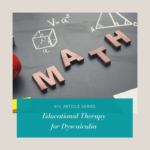
Educational Therapy for Dyscalculia
Iep red flags and how to fix it.

Recommended Posts

Benefits of a Good Summer Learning Plan

What is College Readiness?
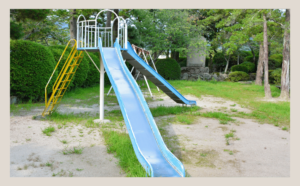
Maximizing Summer Learning

Positive Parent-Teacher Communication Strategies
Home — Essay Samples — Education — High School — The High School to College Transition
The High School to College Transition
- Categories: College Education High School
About this sample

Words: 598 |
Published: Sep 5, 2023
Words: 598 | Page: 1 | 3 min read
Table of contents
The bridge between two worlds, academic expectations, social and personal growth, adjusting to a larger environment, mental and emotional transitions, overcoming challenges, celebrating triumphs.

Cite this Essay
Let us write you an essay from scratch
- 450+ experts on 30 subjects ready to help
- Custom essay delivered in as few as 3 hours
Get high-quality help

Dr. Karlyna PhD
Verified writer
- Expert in: Education

+ 120 experts online
By clicking “Check Writers’ Offers”, you agree to our terms of service and privacy policy . We’ll occasionally send you promo and account related email
No need to pay just yet!
Related Essays
2 pages / 785 words
3 pages / 1378 words
1 pages / 168 words
2 pages / 966 words
Remember! This is just a sample.
You can get your custom paper by one of our expert writers.
121 writers online
Still can’t find what you need?
Browse our vast selection of original essay samples, each expertly formatted and styled
Related Essays on High School
High school, the place where young minds are nurtured, friendships are forged, and the foundations of adulthood are laid. Or at least, that's what they want you to believe. In reality, high school is more like a three-ring [...]
High school is a critical phase in a student's academic journey, laying the foundation for future endeavors. Achieving success during this period requires a combination of effective strategies that can be applied to both [...]
Entering medical school is a significant step on the path to becoming a physician, and many students consider whether to take a gap year before embarking on this rigorous journey. A gap year, often a year-long break between [...]
Graduating from high school marks a significant milestone in one's life, and it is often accompanied by a sense of excitement and anticipation for the future. However, navigating life after high school can be challenging without [...]
In Freemont High School, written by Jonathan Kozol, undesirable conditions of the schools are discussed. Although, the school is located in beautiful Los Angeles, the school is less than favorable. Many students, during any [...]
There are many reasons that we should not have year-round school, including it can actually be a problem for people’s health. Some childhood development experts believe that for some kids it’s vital to have time off. It is also [...]
Related Topics
By clicking “Send”, you agree to our Terms of service and Privacy statement . We will occasionally send you account related emails.
Where do you want us to send this sample?
By clicking “Continue”, you agree to our terms of service and privacy policy.
Be careful. This essay is not unique
This essay was donated by a student and is likely to have been used and submitted before
Download this Sample
Free samples may contain mistakes and not unique parts
Sorry, we could not paraphrase this essay. Our professional writers can rewrite it and get you a unique paper.
Please check your inbox.
We can write you a custom essay that will follow your exact instructions and meet the deadlines. Let's fix your grades together!
Get Your Personalized Essay in 3 Hours or Less!
We use cookies to personalyze your web-site experience. By continuing we’ll assume you board with our cookie policy .
- Instructions Followed To The Letter
- Deadlines Met At Every Stage
- Unique And Plagiarism Free
Top Nav Breadcrumb
- Ask a question

My experience in the transition from high school to college
Diploma Programme (DP) graduate Eduardo Sebastián Flores Linares shares his journey with higher education after the IB. This is his second story in our graduate voices series.

Eduardo Flores Linares is an IB graduate of Colegio San Agustín in Lima, Peru and is currently pursuing a Bachelor’s degree on Management at Pontificia Universidad Católica del Perú. He identifies himself as someone who looks for positive change in benefit for the society, a lifelong learner and a trustable person. When he’s not engaging in discussions about how to improve life quality all around the world, you will find him hanging out with friends and having a good time. You can find him on his LinkedIn .
To hear more from Diploma Programme (DP) graduates check out these IB programme stories. If you are an IB grad and want to share your story, write to us at [email protected]. We appreciate your support in sharing IB stories and invite you to connect with us on LinkedIn , Twitter and now Instagram !
If you enjoyed this story, consider reading more below:

#alumnistory , Graduate Voices
About the IB
- Writing Home
- Writing Advice Home
The Transition from High School to University Writing
- Printable PDF Version
- Fair-Use Policy
To meet the expectations of university writing, you will need to unlearn rules you may have learned in high school. Those rules may have helped you to plan and write your essays by providing a ready-made structure you could fit your ideas into. But continuing to rely on these rules will limit your freedom to develop more sophisticated arguments and a more mature style.
Here are some important differences between high school rules and university expectations:
Essay Structure
Thesis Statement
Introduction and Conclusion
Presentation
Here are the overall differences between the two institutions in philosophy and approach:

- Learning Skills
The Transition from High School to College
Search SkillsYouNeed:
Learning Skills:
- A - Z List of Learning Skills
- What is Learning?
- Learning Approaches
- Learning Styles
- 8 Types of Learning Styles
- Understanding Your Preferences to Aid Learning
- Lifelong Learning
- Decisions to Make Before Applying to University
- Top Tips for Surviving Student Life
- Living Online: Education and Learning
- Critical Thinking Skills
- Critical Thinking and Fake News
- Understanding and Addressing Conspiracy Theories
- Critical Analysis
- Study Skills
Get the SkillsYouNeed Study Skills eBook

Part of the Skills You Need Guide for Students .
- Writing a Dissertation or Thesis
- Research Methods
- Teaching, Coaching, Mentoring and Counselling
- Employability Skills for Graduates
Subscribe to our FREE newsletter and start improving your life in just 5 minutes a day.
You'll get our 5 free 'One Minute Life Skills' and our weekly newsletter.
We'll never share your email address and you can unsubscribe at any time.
The transition from high school to college is often full of surprises for the unprepared.
Although there’s a set of skills that’s required in both contexts, college requires that you master more challenging study skills, including understanding and analyzing complex academic material, time management, and stress management.
In addition, you'll need to learn to become more of an independent student, as your teacher-based support system is usually less available in the higher levels of education.
Although not essential for high school, these principles are still useful during those years. What's more, by mastering these skills early on you'll set yourself up for success when you do get to college.
Advanced Study Skills
While there’s still a large amount of hand-holding in high school, once in college you will be expected to exhibit independent and advanced study skills, such as analyzing, researching, note taking, listening, and comprehension, to name a few.
During high school most projects will be short, but having mastered these study skills, your abilities will help you to do well during your high-stakes exams and do even better in any short projects you might be assigned to.
See the SkillsYouNeed Study Skills section for more.
Time Management
During high school you may already need great time management skills, but remember that your workload will only grow bigger the more you advance through your school years.
Learning to create schedules and sticking to them is crucial. For efficient time management you must learn to anticipate course needs and plan and study well in advance to avoid burnouts. Another skill that might contribute to better time management is speed reading.
Given how your study material will generally grow more difficult and lengthy, being able to read faster than the average student, without sacrificing comprehension, will save you a lot of time and keep stress at bay. Especially for college courses, speed reading will spare you the frustration of having to go through tons of literature and compulsory study material in a limited time, and let you stay ahead of your coursework responsibilities, all thanks to an efficient reading pace.
See our pages: Finding Time for Study and Time Management for more information.
Motivation and Self-discipline
While not academic skills per se, motivation and self-discipline are two skills and virtues you must cultivate during your high school years. Both high school and college are stressful times with a lot of duties and expectations for students, so being able to find motivation and practice discipline are vital to your success.
During your college years, where you will be more independent, being able to objectively assess your studying behavior will let you stay within schedule and do well in your exams and coursework.
See our pages Self-Motivation and Personal Development for more details.
Note-taking
Many colleges follow a lecture model of teaching. Most of your classes will be in vast auditoriums along with as many as 300 hundred other students. Being able to take notes efficiently is the basis for academic success.
Note-taking is a demanding skill. If you learn it during high school, your skill will improve your exam scores and help you to study with less effort during college. Note-taking has to be intelligent, selective, and critical. It requires practice and a lot of focus on your part to take meaningful notes that will later assist and guide your studying.
See our pages: Note-Taking for Lectures and Note-Taking for Reading to help develop effective note-taking techniques.
Further Reading from Skills You Need

The Skills You Need Guide for Students

Develop the skills you need to make the most of your time as a student.
Our eBooks are ideal for students at all stages of education, school, college and university. They are full of easy-to-follow practical information that will help you to learn more effectively and get better grades.
In Summary...
These skills are not only useful for those students in high school and those who are college bound; in fact, many career paths will expect you to have mastered these skills to be an efficient and productive employee.
The key is to start early. Ask around your school for any classes or seminars on note-taking, researching, and time management. You can also see if your local community center offers such classes you can join.
Finally, remember that a library is always a good resource; visit your library for some textbook knowledge on how to master these skills.
About the Author
Chassie Lee is the Content Expert for eReflect – creator of Vocab1 which is currently being used by tens of thousands of happy customers in over 110 countries.
Continue to: Study Skills Decisions to Make Before Applying to University
See also: Critical Thinking 6 Skills You Learn in School That You Use in Real Life Learning Habits of Successful People: Top-Notch Tips for You
Our Sterile Processing Technician Prozzzzgram Is Now Available
5 Day Money-Back Commitment Get More Info.
5 Day Money-Back Commitment
Up to $723 off tuition with our December Savings Offer! Get More Info.
Iron Clad Money-Back Commitment & Low Monthly Payment Options Available. Get More Info.
Request Information
*By clicking the Next Step button, I am giving my express written consent for U.S. Career Institute to mail, email, call or text me using automated technology including pre-recorded messages and auto-dialers about educational services and future offers at the information provided above, including my wireless number. I understand that I am not required to provide this consent to attend U.S. Career Institute. As an alternative to providing this consent, I may call the school at 866-250-6851.
Finishing High School Online
How Does High School Online Work?
Are Online High School Diplomas Legitimate?
How to Enroll and Apply
The Benefits & Importance of Getting a High School Diploma Online
How to Graduate From High School Early by Taking Online Summer Courses
I Dropped Out of High School: Is There an Online High School for Dropouts?
- USCI High School Home
Navigating the High School to College Transition
By: Jordin Frey
The transition to college from high school can feel daunting. Many students are leaving home to go to a much larger school in a new area. This new school may be filled with students from all different places and with a variety of different experiences. It's a far cry from the life they're used to, and it can be jarring. On top of social changes, College also comes with different education expectations. College comes with a lot of changes, but there are some things you can do to prepare yourself so you feel more comfortable.
How Do I Transition From High School to College?
The biggest challenge to focus on when making the transition from high school to college is that you'll need to take a lot more responsibility for your own learning. In high school, you have a rigid schedule and smaller class sizes, and both factors can help to keep you on track. When you're in college, you have a lot more freedom to make your own schedule and the classes can be larger and less frequent. It's important to learn the skills you'll need to ensure your own success.
Time Management:
The most important thing to focus on in the high school to college transition is the development of time management skills. You may be taking fewer courses at once than you did in high school, but the courses are harder and don't meet every day. You'll need to keep careful track of assignment deadlines, and you'll need to be able to schedule your time to fit in academic obligations as well as other activities.
Study Skills
If you've never been very good at studying , work on that now. High school teachers might let you make up tests you didn't do well on or missed for whatever reason, but that's not likely in college. Professors generally don't give retests or give you the opportunity to take a test later unless students have a valid reason.
Reading and Writing Skills
Brush up on your reading and writing skills. Most courses have required reading to do outside of class, and professors will expect you to come to class prepared to discuss what you've read. Most majors also require students to write well-developed essays to prove their understanding of the subject matter.
Life Skills
Not having your parents around to help you manage your schedule means that they're not there to help you manage your money, either. Part of the transition from high school to college will be figuring out how to budget for yourself. Even if you're using loans to pay for your housing and a meal plan, you'll probably have a work-study or off-campus job that gives you some pocket money, and when you want to go out with friends, you'll need to stay within your means.
Ask for Help
You'll need to be able to advocate for yourself. If you're struggling with course material, it's OK to ask for help. Most professors will have office hours as a way of making themselves available to students who need help. If you're struggling with the transition in general, talk to your advisor or your parents. There's no shame in asking for help when you need it. Asking for help may even bring up options that you didn't know existed.
Meet People
College can be a big change and it can be intimidating to meet new friends. If you have one, reach out to your roommate before hand so you are familiar with who you will be rooming with. Once you get to school go to a club fair and find a club or sport you are interested in, so you can meet new people!
When it comes down to it, the key to figuring out how to go from high school to college is learning to take more responsibility for yourself and your own success. Students who do their best to improve their study skills, manage their time wisely, and making connections with other people are likely to fare better on campus than those who don't.
Sources: https://www.edutopia.org/article/5-research-backed-studying-techniques


A Guide to a Smooth Transition from High School to College
Graduating from high school and going to college can be a shocking transition for many students, even those that are used to being at the top of their class! There is no right or wrong way to transition because everyone has unique personal and academic experiences before pursuing higher education. However, generally speaking, college assignments and exams are much more rigorous. With there being fewer assignments, every grade counts.
If you’ve decided on a college to attend, congratulations! It’s now time to prepare for the big transition! Here are a few tips to help you bridge the gap and adapt seamlessly to university life.
Create a Schedule
First thing’s first: Make a manageable schedule that will set you up for success. This could mean different things to different people. For example, if you work best with tight structure , then you may explore blocking out every hour for productive activities like waking/sleeping, eating nourishing meals, exercising , studying, attending classes, working, and socializing. A well-rounded schedule is key to staying sane, so maintaining balance is essential. Consider how many classes you think you can handle each quarter or semester, and try not to stretch yourself too far. Doing so may result in falling behind on other important life aspects necessary for vital health and success.
TIP : The great thing about college is that unlike in high school, you don’t have to take morning classes if you are not a morning person. Alternatively, late-night classes are not necessarily mandatory for those who prefer to stay in once it gets dark out. In college, you get a lot more freedom with scheduling. Take advantage of this by checking out course availability and putting together a class schedule that best suits your lifestyle.
Know Your Resources
It’s totally normal to come across a few roadblocks in college. If you find yourself struggling in a class, it’s best to ask for help right away. Do it while your mind is still fresh on the topic that you need clarification on. Waiting too long may result in never getting the help you need, which may hamper your ability to do well in a class. Professors hold regular office hours, a block of time set aside for students to come in and ask questions. Depending on your institution, there may also be free tutoring services and study-skills workshops available. If you have a physical or learning disability, then find out what additional resources and accommodations are at your disposal.
Getting a mentor or two can also enhance your college experience. Identify peers you respect, resident assistants, career counselors, academic advisors, and alumni that can give you direction, motivation, and even help you land your future dream job! Familiarizing yourself with available resources ahead of time will set you up for success.
Show Up Everyday
We may all have days where we don’t feel like going to class. Unlike in high school, college professors don’t often take attendance, and mom and dad aren’t around to wake you up. At the end of the day, higher education is what you make of it. That being said, it’s important to take responsibility for yourself and go to class every day. Showing up allows you to stay on top of course materials and learn what your professor considers most important. This may clue you into what exams may entail! In class, take thorough notes in a way that’s conducive to your study habits, and maybe even find a reliable study buddy who can help fill you in if you’re ever absent.
Enjoy the College Experience
College can get stressful, especially around exam time. It can be easy to get stuck in a moment, but the reality is these four years seem to fly by quickly. Soon before you know it, you’ll be out in the real world working through to your retirement! College is a great place to embrace your youth and experience new things that you didn’t in high school. Don’t be afraid to take fun classes for the purpose of learning and engaging in new material, even if they don’t account for much towards your degree. If you still aren’t sure what you want to pursue after college, then taking a variety of courses may help you get a better idea.
In addition to exploring various courses, don’t forget to join a club, volunteer for a cause that’s close to your heart, and explore your university surroundings! College is about more than just studying all day. By joining a club or volunteering, you may meet interesting people that you wouldn’t otherwise. Networking is a crucial part of the college experience that could take you far after graduating with a four-year degree. Finally, many people move out of their immediate hometown for college. If this sounds like you, don’t be afraid to venture out and see what your new city offers! For example, if your college is located near a beach, consider switching up your study space and read there while soaking in some Vitamin D. You may just find yourself feeling more rejuvenated and motivated!
Study Smart
In college, professors often do not grade homework like teachers do in high school. In fact, they will assume that you are following the syllabus and completing the assignments on your own even if they aren’t being checked. At the end of the day, it’s your responsibility to reach out for help or clarification when needed before the exam(s).
Everyone studies best differently. Practice exams, pairing up with a study buddy, going above and beyond on assignments, and actively asking questions during professor’s office hours are some effective study methods. Some courses and textbooks may even come with exclusive access to chapter outlines which can be resourceful as a quick refresher before a test.
Coming out of high school, you may be used to having homework assignments to help “cushion” your grades. In college, your grade is determined by how you do on a couple of exams and writing assignments. If you don’t do so well on one, then you may end up with a C final grade, at best. With that said, don’t expect to coast through college if high school was a breeze for you. Plan on studying in a distraction-free zone, and don’t wait until the last minute to do so.
Take “Me Time” Often
The detrimental effects of stress are emotionally, physically, and mentally linked. With a super busy college schedule, you may forget to do the basics to take care of yourself . This can lead to a downward spiral that may prevent you from doing well in school. Remember to practice self-care by taking part in activities that are meaningful to you, knowing when to say no, getting enough sleep each night, surrounding yourself with invigorating people, eating well, and exercising at least 30 minutes a day. Taking some time off of academics can help you feel more refreshed to put in more time to study later.
Adjust Your Expectations
The initial transition period from high school to college can be difficult for some. Don’t feel bad if you find that things are not working out as planned. Instead, give yourself some time to adjust your expectations, modify your schedule, and manage stress so that you can be on the road to a productive four years in college!
For example, if you were able to handle taking seven classes in high school and feel frustrated that you are struggling to juggle only four in college, just remember that college curriculum is more intense and may take some getting used to. Freshmen may find it easier on their mental, emotional, and physical health to start with three classes first and work their way up as they get comfortable with college life.
A big part of the college experience is figuring things out for yourself, learning to make smart decisions, and working time management to your advantage. For example, finding out the time you are most productive and the best reading strategies that help you retain information will help you be successful in and out of the classroom. Additionally, adopting important habits like self-control, a positive attitude, and organization skills will go a long way to ensure that you stay on top of your assignments.
Finally, a last bit of advice for college-bound students: Enjoy the final summer before college so that you are fully relaxed and mentally prepared for a new and exciting chapter of life!


- Feature Stories
- Trending Topics
- In the News
- The Pinnacles Magazine
- Athletic News
- Newsletter Sign-Up
- Campus Life
- Online Learning

Learn how to expertly transition from high school to college with these tips
When going into the first year of college the world is your oyster. Many students will move away from home for the first time and have their first taste of true independence. While this transition is exciting, it can also be challenging to leave behind the structure of high school for a college schedule that requires students to be more self-sufficient and self-motivated.
Luckily, Lees-McRae offers several resources to help first-year students adjust to college life through the Burton Center for Student Success. Beth Beggs, the director of the Burton Center, is a friendly face that all incoming freshmen should get to know, and she is full of advice for new students. Beggs says there are two “deadly habits” that many incoming freshmen struggle with. Knowing these habits is the first step to overcoming them.
The first “deadly habit” is trying to bring high school study habits to college courses. In high school many students had no problem waiting until the last minute to do work and still got good grades, but that’s not as easy in college.
“You probably can do high school work in the same timeline, but it’s coming at you faster, because this is college now. Everything is going to take longer than you anticipate, so be prepared,” Beggs said.
The second “deadly habit” is sleeping late. When you’re living with friends and making your own schedule, it can be hard to hold yourself accountable.
“If you’ve got an 8 a.m. class, be independent,” Beggs advised. “I think students really struggle to find that balance of independence and dependence that first semester. I would say the best preparation for being independent is knowing when to ask for help, and knowing who to ask for help, and the Burton Center is a huge part of that.”
The Burton Center offers resources to help students get ahead of these habits, including peer coaching for traditional trouble courses such as math and science courses, the Ratchford Writing Center, the first-year experience course, and much more.
Beggs recommends students take the first-year experience course seriously, as it will help them develop essential skills that lead to success in college and beyond.
“It’s the introduction to college life; it will tell you how and where to make friends, it will tell you what’s going on around campus, what’s fun to do in the area, and where every form of support on campus is located,” Beggs said. “You get to meet the people who work in counseling, financial aid, and admissions so that if you have questions you get to see the face of the person you might want to go talk to.”
Self-scheduling and time management is a big focus of the course, and is a skill that Beggs said can make all the difference when it comes to managing the independence that comes with college life. She strongly suggests using and maintaining a planner to help remember assignments, block off study time, and even keep track of social obligations.
One resource available to students through the Burton Center is the peer coaching program. Peer coaches are trained to help their fellow students with assignments for any class, as well as provide general study and organization tips.
Another valuable resource is the Ratchford Writing Center, which employs peer coaches that can specifically help students become stronger writers.
“The writing coaches will be able to help you work through your writing, and maybe give you some suggestions,” Beggs said.
In addition to these options, students are encouraged to visit the Burton Center for resources to help them overcome personal struggles as well. Because of the small student body at Lees-McRae, Beggs and the other staff members at the center are able to form personal relationships with the students and provide support for all kinds of different scenarios.
According to Beggs, there are many student populations who may find the college transition more challenging than most, and she is passionate about providing the necessary support to make their time at Lees-McRae the best it can be.
“I think homeschooled students, those who identify as first-generation where neither of their parents completed a four-year degree, students who are Pell-eligible, students who are student-athletes or work a full-time job, married students with babies—all of these are populations that might face unexpected challenges,” Beggs said. “In the Burton Center, Sue McGuire and I meet with students individually, primarily to talk about how they’re budgeting their time. For example, if you’re talking about a parent of a very young child, there’s not going to be much time to budget, so we talk to them about how to manage that small amount of time they’ve got.”
The biggest recommendation Beggs gives to all incoming freshmen is to take advantage of the many opportunities and resources Lees-McRae provides to make this transition smoother. She encourages students to not be afraid to ask for help—after all, that is what she and the rest of the team at the Burton Center look forward to providing for Bobcats every day.

Protect your mental health all winter long...
February 19, 2024

Your guide to the next 100 days as you...
January 31, 2024

“Emotional Survival for Public Service...
November 16, 2023
- Translators
- Graphic Designers
- Editing Services
- Academic Editing Services
- Admissions Editing Services
- Admissions Essay Editing Services
- AI Content Editing Services
- APA Style Editing Services
- Application Essay Editing Services
- Book Editing Services
- Business Editing Services
- Capstone Paper Editing Services
- Children's Book Editing Services
- College Application Editing Services
- College Essay Editing Services
- Copy Editing Services
- Developmental Editing Services
- Dissertation Editing Services
- eBook Editing Services
- English Editing Services
- Horror Story Editing Services
- Legal Editing Services
- Line Editing Services
- Manuscript Editing Services
- MLA Style Editing Services
- Novel Editing Services
- Paper Editing Services
- Personal Statement Editing Services
- Research Paper Editing Services
- Résumé Editing Services
- Scientific Editing Services
- Short Story Editing Services
- Statement of Purpose Editing Services
- Substantive Editing Services
- Thesis Editing Services
Proofreading
- Proofreading Services
- Admissions Essay Proofreading Services
- Children's Book Proofreading Services
- Legal Proofreading Services
- Novel Proofreading Services
- Personal Statement Proofreading Services
- Research Proposal Proofreading Services
- Statement of Purpose Proofreading Services
Translation
- Translation Services
Graphic Design
- Graphic Design Services
- Dungeons & Dragons Design Services
- Sticker Design Services
- Writing Services
Please enter the email address you used for your account. Your sign in information will be sent to your email address after it has been verified.
Transitioning from High School to College Academic Writing

You've done it — you've been accepted to college! Those countless campus tours and application essays have finally paid off. While this is undoubtedly an exciting milestone, it can also bring uncertainty and worry. College education can saddle you with a more significant workload, and you'll be taught by professors with higher expectations.
One subject that significantly differs between high school and college is writing. You might have become accustomed to the 5-paragraph essay model in high school, which served you well then. However, college requires a more advanced level of writing that does not rely on an outlined structure. How can you successfully make the shift from high school to college writing?
Breaking away from the 5-paragraph essay
We learned this format as early as elementary school and applied it throughout middle and high school. Here is the basic structure:
- Introduction
- 1 st body paragraph: Main idea #1
- 2 nd body paragraph: Main idea #2
- 3 rd body paragraph: Main idea #3
The 5-paragraph essay is a simple and effective way to organize your writing into distinct sections. The introduction introduces your thesis statement. The three body paragraphs each represent one main idea. The conclusion is a summary of what you've written. Although this is a great way to learn to write papers, this format is too formulaic and isn't functional beyond high school. Let's break down the differences between high school-level and college-level writing, paragraph by paragraph.
What makes a great college-level introduction

The introduction is the first paragraph of the essay. It introduces your argument or thesis statement and creates a roadmap to prove your thesis throughout the rest of your paper. It is essential to make your introduction clear and detailed, so your readers know what to expect. In fact, this is probably the most important part of your essay, so it's important to familiarize yourself with the different techniques you can use at the beginning to grab the reader's attention. If you still don't know how to start your essay, check out the various study materials on the Studocu educational platform.
Here's what a high school-level introduction entails and how a college-level introduction departs from that model.
High school…
- Hook : The hook is the first sentence of the introduction. Its purpose is to draw readers into your paper — to entice them to read the rest of it. A hook can be a question, quote, anecdote, or even exclamation. The hook does not need to correlate directly to your argument.
- Thesis statement : The thesis statement is introduced toward the end of the introduction. It is typically one sentence with three main points — each representing one of the essay's body paragraphs — that will prove the thesis. The thesis should be argumentative, but it can be broad and general.
Versus college
- No hook : College essay introductions do not require a hook. Since many college papers have word count and page requirements, a hook will take up unnecessary space. It's better to dive straight into your argument than to pander to your reader with an eye-catching statement.
- Thesis statement : The thesis statement is still included, introduced toward the end of the introduction. It can vary in length between one to three sentences, depending on the complexity of your argument. Your thesis does not require three main supporting points; you can use as many or as few supporting details as you need to prove your thesis. Most importantly, your thesis should be specific and argumentative.
Building strong body paragraphs

Once you've got your introduction down, it's time to begin your body paragraphs. These are where you're likely to see the most significant differences between high school-level and college-level writing.
Under the 5-paragraph essay format, high school essays contain three body paragraphs. There are no strict length requirements for each of the body paragraphs. Each body represents one of the three main ideas chosen to prove the thesis, and each main idea has three points of evidence to support it.
Let's consider an example. Your essay thesis centers on the importance of helping to reduce climate change. Here is an outline of the contents of one body paragraph:
Body paragraph #1 : Alternative transportation methods can help reduce your carbon footprint.
- Evidence #1 : Carpooling
- Evidence #2 : Bike riding
- Evidence #3 : Walking
These three pieces of evidence support the main idea of your first body paragraph.
Here are some other ideas to consider as you write your body paragraphs:
- Research and sources : High school papers don't usually include much — if any — external source material, so you don't have to do any additional research. For example, an essay on John Steinbeck's The Grapes of Wrath will include evidence solely from the book. Likewise, a lab report or scientific paper will contain information from the lab you have completed. Some high school research papers require external research but not to the same degree as a college paper.
- Analysis : In high school papers, analysis of evidence is present but not extensive. It may point out more general ideas that are pretty obvious to readers. One piece of evidence can include two to three sentences of analysis and stop there.
- Transitional statements : You will most likely include transitional phrases such as "in conclusion" or "in addition" in your writing. They serve to move you from one point to the next, but they don't provide much context for your argument. Each body paragraph will have an opening sentence relating to its respective main idea.
- Connection to the thesis : Each body paragraph focuses solely on its main idea. There is little to no connection back to the thesis because it is assumed that the bodies serve the thesis.
College papers can have as few or as many body paragraphs as you need to prove your argument. The amount of body paragraphs you have is also influenced by the page length restriction or other requirements for your paper.
Body paragraphs should never exceed one page in length. They are each typically one to two-thirds of a page. If your body paragraph is longer than one page, you likely have enough evidence and analysis to split that paragraph into two separate bodies. Double-check to ensure you are not combining two points into one body paragraph. Each paragraph should have its own main idea.
Some other things to consider as you write your body paragraphs are:
- Research and sources : College papers will often require external research and sources. This isn't always a requirement, but the extent of external research is more common than in high school. For example, an essay on John Steinbeck's The Grapes of Wrath may include direct quotes from the book as well as external research on the Great Depression and the Dust Bowl . Likewise, a scientific research paper might include results from your own experiment and external statistics from past published experiments.
- Analysis : Aside from the thesis statement, your analysis is the most important part of the paper. The analysis is extensive and specific, aiming to bring light to an unexplored topic. You will point out small details readers may have considered unimportant and draw conclusions about them. You'll bring a fresh perspective to evidence and teach your readers something new.
- Transitional statements : You'll likely use transitional statements in your college writing, but they will serve a more significant purpose. Each body paragraph will begin with a transitional sentence connecting one body paragraph to the next. They should be specific — not general — and outline what you'll be discussing in the paragraph. You do not want any of your paragraphs to be disconnected. After all, they each serve the same purpose: proving the thesis statement.
- Connection to the thesis : Every body paragraph refers back to the thesis. While each paragraph has its main idea to discuss, you can't forget the purpose of each one. You should actively discuss how your analysis of evidence proves your argument.
Ending with a strong conclusion

The conclusion is the last paragraph of an essay. Like the other elements, the content of the conclusion differs between high school writing and college writing.
- Summary : High school conclusions summarize what you've discussed throughout your paper. You restate the thesis and the three main points you've made supporting your argument. There is no further analysis included in the conclusion.
- Drawing connections : These conclusions draw no connections between disciplines. For example, an English paper conclusion solely discusses what was written in the essay. Using The Grapes of Wrath as a topic example again, the conclusion focuses only on the book and its literary implications. You do not draw connections between the book content and its historical connections.
- Summary : While you usually restate the thesis at the end, college conclusions are not merely a summary of what you've written. Rather, these conclusions answer the "so what?" question. Why should readers care about your argument? Why is your paper important? What does it add to the existing research on this topic? What's its relevance? These are just some of the questions to consider as you craft your concluding statements.
- Drawing connections : One way to answer the "so what?" question is to draw interdisciplinary connections between what you've said and what's already been written. For example, if you're writing a sociology paper on the foster care system in the United States, you could connect it to what you've learned in an economics or history class. How does a child's socioeconomic status impact the likelihood of ending up in the foster care system? How has the creation and role of the foster care system evolved over time? These are the kind of questions to consider as you make connections across disciplines in your conclusion.
Other things to keep in mind

Now that we've discussed the differences in formulating your papers, let's consider some of the other key distinctions between high school and college writing.
Quality over quantity
High school writing assignments do not tend to have minimum word counts to meet, so you can write as much as you want to prove your argument. However, college writing assignments usually have strict word count requirements so that you focus on the quality of your writing instead of the quantity. You must write good, compelling arguments and analysis. Your writing should be concise so you can communicate your ideas clearly and effectively without filling your paper with fluff.
Summary vs. analysis
While high school writing does require some analysis, the summary does not introduce new ideas. You can summarize a source as evidence and summarize your paper in the conclusion. In contrast, college writing requires strict analysis. Any summary you provide should be no longer than one or two sentences to introduce a source or provide context.
With college writing, you need to provide quality analysis. Consider everything — even the most minor details — including punctuation marks, speech patterns, and motifs , because sometimes the smallest, most inconsequential-seeming points make for the most significant analysis.
Word choice and specificity
You might be tempted to use complicated language in your college papers to impress your professors. Spoiler alert: they probably won't be as impressed as you might have thought. Instead, use field-specific terminology throughout your paper. If you're writing a biology research paper, it will make sense to include words like "polypeptides" and "anabolism." When writing your paper, take care to use simple language that fits the context of your argument. This will keep your writing clear and concise, prioritizing understanding over complexity
Specificity is similar to word choice, but it refers particularly to overstatements . You should avoid using overstatements in your college writing. Generalized phrases like "society," "throughout history," and "many people believe" are examples of terms that signify generalizations and assumptions. Remain focused in your writing and use terms specific to the community, institution, or field you're writing about.
Tone, voice, and tense
In college, your writing should maintain an active voice. This gives your writing more clarity. Your tone depends on your argument, but it should mostly remain neutral. Your tone matters most when you include external research in your argument. For example, if you're paraphrasing a scholarly article with a positive tone, your paraphrased version should also convey a positive tone.
The tense is also largely dependent on what you're writing. For example, English Literature papers use the present tense. Meanwhile, some disciplines – like the sciences – do not have a strict tense requirement and might include a mix of past, present, and future tenses. You should always be aware of what tense your discipline requires.
High school papers almost always use MLA for citations, if they require citations at all. College citations depend on the disciple in which you are writing. For example, English Literature essays follow MLA format, which includes the use of parenthetical citations in your paper. However, history or political science papers require Chicago Style citations — this includes the use of footnotes, not parenthetical citations. Psychology and behavioral science disciplines use APA style .
The distinction between style guides might be confusing, but there are many informative sources online, such as Purdue Owl , that can teach you how to properly cite a source in any citation style.
Making the transition
We've thrown a lot of information at you about making the move from high school to college, so take your time learning your new expectations and go easy on yourself as you learn new ways to write. Don't forget that practice makes perfect, so practice writing as much as you can.
If you find yourself continuing to struggle in this transition from high school to college writing, don't be afraid to ask your professors for help. They hold office hours for a reason! You can stop by to discuss your thesis, and some professors will even read drafts of students' essays and give valuable feedback. Remember that you're not the only one trying to make this shift. You have plenty of resources at your disposal — use them!
Header photo by Mangostar .
Related Posts

Writing Your Thesis Proposal Like a Pro

Understanding Dependent Variables
- Academic Writing Advice
- All Blog Posts
- Writing Advice
- Admissions Writing Advice
- Book Writing Advice
- Short Story Advice
- Employment Writing Advice
- Business Writing Advice
- Web Content Advice
- Article Writing Advice
- Magazine Writing Advice
- Grammar Advice
- Dialect Advice
- Editing Advice
- Freelance Advice
- Legal Writing Advice
- Poetry Advice
- Graphic Design Advice
- Logo Design Advice
- Translation Advice
- Blog Reviews
- Short Story Award Winners
- Scholarship Winners

Need an academic editor before submitting your work?
Important Addresses

Harvard College
University Hall Cambridge, MA 02138
Harvard College Admissions Office and Griffin Financial Aid Office
86 Brattle Street Cambridge, MA 02138
Social Links
If you are located in the European Union, Iceland, Liechtenstein or Norway (the “European Economic Area”), please click here for additional information about ways that certain Harvard University Schools, Centers, units and controlled entities, including this one, may collect, use, and share information about you.
- Application Tips
- Navigating Campus
- Preparing for College
- How to Complete the FAFSA
- What to Expect After You Apply
- View All Guides
- Parents & Families
- School Counselors
- Información en Español
- Undergraduate Viewbook
- View All Resources
Search and Useful Links
Search the site, search suggestions, five tips on how to transition from high school to college.
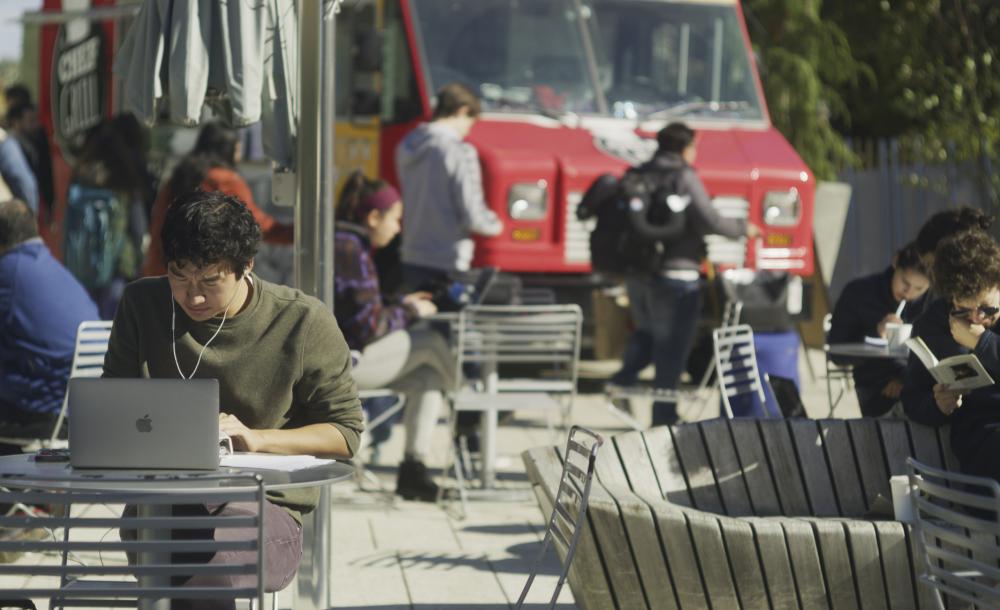
Whenever I'm answering questions from prospective students a topic that always comes up is the transition from high school to college.
Is it hard? What can I do to have an easy transition period? How was your transition? The reality is that there isn't necessarily a right or wrong way to transition to college. Everyone is coming from a different background so naturally they will adapt in different ways. But, here are some tips to help make your transition a smooth one.
1. Ask for Help A lot of Harvard students are too scared to ask for help once they arrive on campus. I mean we are all super geniuses. We got basically straight As in high school. Why would we need help?
The reality is that you are engaging with new academic material here at Harvard and because of that you're going to struggle and you may need help. There's nothing wrong with you. Everyone struggles with their academics here, trust me. My freshman year I was riding the struggle bus. Honestly, I was probably driving it because I was struggling so hard with certain subjects, particularly economics. Because of that, I knew I needed to seek help. So, I asked friends for help with problem sets, sought out a tutor, and went to office hours when I could. Never be afraid to ask for help!
2. Don't be afraid to fail First and foremost, I'm not talking about failing in terms of getting an F. The reality is that if you actually do your work you will probably not fail. But, a lot of students tend to get really worried when out of nowhere they get a B in a class, which can seem like a failure for students. It's like wait, what I never had this grade before. This isn't something I do. I mean I'm a straight A student! What's happening?
The reality is you might get a B or two or even three. It happens. Like I said earlier, you are engaging with new material here at Harvard and sometimes you will struggle with it. So, don't freak out if you suddenly get this ominous looking B. As long as you tried your best, there's really nothing more you can do.
3. Explore new subjects so you can learn Another thing that students forget about is actually taking the time to learn. When you're in college you can finally take classes simply for the sake of learning. You can engage with new material and learn some pretty cool stuff. So far I've taken classes about comparative politics, microeconomics, social movements, ancient Greek novels, discussing modern day feminism and so much more. College is the time for you to try something new. Hey you may know exactly what you want to concentrate in and do later on in your life, but why not try a new subject. You may be a Molecular and Cellular Biology concentrator, but maybe you're interested in talking about gender so you take a class in Studies of Women, Gender, and Sexuality.
You should always strive to try and learn something new because it can be fun. However, trying a new subject doesn't mean you will automatically enjoy it. I can tell you for a fact that to this day I still don't enjoy Economics nor am I truly interested in Comparative Politics. But, I am proud of myself for trying them out and don't entirely regret it. So don't forget to actually learn and try new things when picking your classes.
4. Do what you like, not just to boost your resume For me, a lot of high school was focused on doing everything right so I could get into college. Sometimes I didn't take the time to do things just because I wanted to do them. I would think about what looked best on my resume or what extracurricular would be the best on that college application. I think it's very easy to get caught up in trying to do all the "right" extracurriculars and classes. Concentrating in what's going to give you a job. Doing that extracurricular that supposedly looks really good on your resume but you're just not that into it. In the process, you just forget to just enjoy yourself. Take that class because you like it. Do that cool extracurricular. Even if they aren't the stereotypical courses or activities people do, odds are you will be able to earn the marketable skills that look good on a resume without having to do something you dislike.
5.Learn to take time for yourself A very important skill to develop is learning how to take a step back from everything and de-stress. In college, so much can be going on that sometimes you want a chance to breathe. Maybe that means not going to that basketball game or not going out on Friday night to instead stay in and watch Netflix or whatever you do to de-stress. I know I had to learn how to take some time for myself to do things I love. Sometimes I'll decide to do my homework later (wouldn't recommend doing this often ;)) and lie in my bed and read a book. Other times, I'll get out my iPad and watch an episode of Netflix. Sometimes, I'll put in my headphones and dance around my room. It's really about doing whatever can help you de-stress and just enjoy yourself. So learn how to take those 5 minutes, 10 minutes, or even an hour to just relax.
I hope these tips will help you as you continue through your high school career and eventually transition to college. You might mess up along the way, which is completely normal. Just try to enjoy it as much as you can!
Gabriela Class of '18 Alumni

Student Voices
Harvard housing day.
Denzel Class of '24
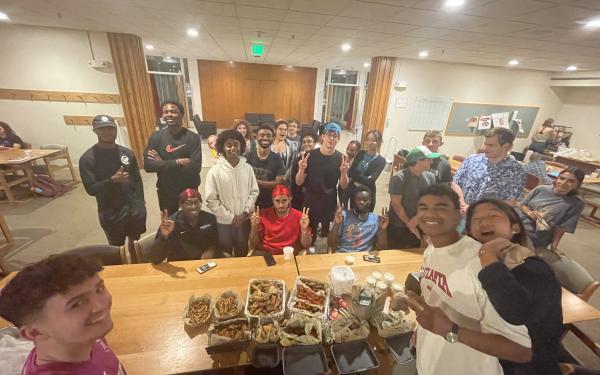
Packing for Harvard: Things I Wish I Knew
Ricky Class of '27
What to Look Forward to as a First-Year at Harvard
Samia Afrose Class of '25


How to Handle the Transition from High School to College
You’re finally free from the rules and curfews imposed by your parents and you’re ready to spread your wings! This is an exciting and scary time in your life and for most people, the transition from high school to college is the biggest transition they make in their life up until this point. Before you leave the nest without looking back, think about what you’ll do to help yourself make it a smooth transition.
Even if you think you’re fully prepared and you’ve been dreaming of this for years, you’ll likely struggle at least a little bit with the college transition. One of the things that makes this so difficult for many people is that there is much more to this transition than school.
You’re away from your parents for the first time, you suddenly have complete independence, you’re potentially away from all of your friends, you’re sharing a very small room with a stranger… the way you’ve lived your life for the past 18 years completely changes.
If you don’t have the proper support, you can struggle a lot with the transition. The dropout rate of college freshmen in the United States is a staggering 30%. Many colleges now have transition programs in place to help freshmen make a smooth transition and to try to lower that 30%. Whether your school has a program to help you or not, think about what you, personally, can do to help ease yourself into this new lifestyle.
Topics on this page: > General Transition Strategies & Tips > College Preparation in 9th Grade > College Preparation in 10th Grade > College Preparation in 11th Grade
General Transition Strategies & Tips
Go to class.
This strategy seems obvious, but it can be very hard when your parents aren’t there to make you go anymore. If you haven’t scheduled your classes yet, you can make it easier for yourself by trying to avoid class times you know you’ll be tempted to skip. (8 a.m. lecture, anyone?) One of the best things about college is that you get to decide how you live your life, so if you are responsible regarding your decisions, you can set up your daily schedule to help you achieve success.
In a study from the University of California Santa Cruz , researchers found that (unsurprisingly) students who actually attended class did better on their final exam than students who did not attend class. If you do have to miss class, your professors won’t have materials ready for you when you return like your high school teachers did. It’s up to you to get the information you missed, and you’ll probably have to rely on notes from a classmate.
When you were in high school, you had 180 different class sessions for one class throughout the year. In college, you could have as few as 30 or even 15 class sessions for one class. By just missing one class, you are missing a large amount of material.
Think about your courses in monetary terms, as well. Say, for example, your tuition is $7,000 for the semester. If you have five classes, each class is worth $1,400. If you have 15 weeks of classes and your class runs two times per week, that means each class is about $46. Every time you think about skipping class, imagine throwing $46 out the window. You (or your parents) are paying for your education; make sure you take advantage of it.
Be engaged in class
Actually going to class is important for academic success, but you need to pay attention once you’re there, too. Don’t give in to the temptation to zone out when you’re sitting in a huge lecture hall. Pay attention, take notes, and don’t be afraid to ask a classmate, TA, or professor for help if you’re confused.
The rigor of your college classes will be very different from what you experienced in high school. The pace is much faster and the material is more complex. If you don’t pay attention and stay on top of it, it won’t take long to get behind and be completely lost.
Usually in high school, there is a lot of downtime in class, but you won’t find this in college. Your professors will teach what they want to teach and that will be it. You may even find that your classes will end early at times because the professors don’t have to make sure they fill every minute of the class with content or activities like your teachers did in high school. If your professor finishes what they wanted to teach and there are still 15 minutes left of class time, they will often end class early. This just goes to show that every second and every piece of content in a college class matters.

Use your resources
College campuses are full of resources to help students succeed, but the trick is that you have to seek them out. Almost all campuses have writing centers and tutors available to students, and professors hold office hours for students to get extra help or ask questions.
Following is a list of facilities and resources most campuses have that can help make your academic life a success:
- Writing center
- Career counselor
- Academic adviser
- Teaching assistants
- Computer labs
- Information technology services (ITS)
- Free access to online journals
- Office hours
Have a study strategy
Avoid pulling an all-nighter and have the discipline to study and review your notes consistently. After being in school for 12 years, you should have a good idea of what type of studying works best for you- flash cards, rewriting your notes, finding a study group, etc.
College campuses also have great study spots, so find the perfect spot for you. Whether it’s the library, a quiet campus building, a nice bench, or a comfy seat in the student center between classes, a great study spot is a must! Try to find somewhere where you won’t be tempted by distractions and condition yourself to only study in this spot. After a while, it will become second nature to get right down to work when you go to this spot.
Treat your body well
You don’t have to gain the freshman 15! Beginning or continuing an unhealthy lifestyle while you’re going through so many other changes just makes the transition that much harder. According to success.com , you need good food, sleep, and exercise to be successful. When you treat your body well, you feel better and more motivated, so this creates a positive snowball effect for every other aspect of your life. Try to limit the number of times you take advantage of the all you can eat dessert in the dining commons.
There are a lot of things in the sleep, food, and exercise category that were likely in your life before, but will be missing when you get to college. You won’t have home cooked meals in your dorm room, you won’t have sports practice or gym class to keep your body moving, and you won’t have your big comfy bed in a dark and quiet bedroom. College makes it difficult to treat your body well, but do the best you can in these categories.
Work on your roommate relationship
Your roommate can be a great source of comfort and support when you’re going through this transition. Living right along with someone who is going through the same thing can be helpful; don’t be afraid to vent with your roommate and let them know if you’re struggling.
On the other hand, sometimes roommate relationships don’t come easy, and if this is the case for you, it’s probably best not to force it. If you try too hard to be best friends with your roommate if it’s clear the connection isn’t there, you may create a tense and awkward relationship. You also don’t want to retaliate against your roommate if you don’t get along; this will only make things worse. Do your best to live amicably with them.
Find your inner circle
One of the things that makes this transition hard is that it can be really lonely, especially if you’re far away from home. Try to find an inner circle that makes you feel comfortable; this could be a club, a group of friends on your dorm floor, or other students with the same major. If you are able to find a group where you fit in, you’ll have a great support system to help you when you’re struggling with the transition to college life.
If you’re struggling to fit in, reach out to those around you: your RA, your classmates, an acquaintance from your hometown, etc. You would probably be surprised at how many people would be willing to help you feel at home and help your transition to college. According to an article for U.S. News & World Report ,
College success happens when the academics of an institution totally blow your mind, and the social aspect of college life helps you learn and grow into a new, amazing person. When one of these aspects is off and you feel like you just don’t fit in, your entire college life suffers.
If you find yourself getting too caught up in the academic aspect and completely neglecting the social aspect, you may realize that you don’t have a support system in place when you need one.
Make it feel like home
When you first step into your dorm room, it might feel very uninviting. Even if you don’t have the eye of a decorator, take some time to give your room a few touches that feel like home. Try adding curtains to your window, hanging pictures of your family and pets, or adding an area rug. When you’re missing the comforts of home and are feeling a little homesick, these small touches can make a huge difference.
You can also make college feel more like home by finding places to go that remind you of your home or your family. For example, maybe you love going to the mall with your mom; find the closest mall and take some time to just relax there. Maybe you find yourself missing the comfort of your dog or cat. Find a local animal shelter and see if they are accepting volunteers.
It’s normal to feel lonely and homesick. Don’t be afraid to feel those feelings, but don’t just wallow in them either. Take practical steps to make yourself feel better. The more you keep yourself busy and integrate yourself into the community at your school, the less you will feel these feelings.
Know your coping strategies
When you start to struggle with something or get stressed out, what do you turn to? Maybe you like to exercise or you need a long chat with your mom. Make sure you know what your coping strategies are and find ways you can easily rely on them while on campus. One mistake a lot of students make when they suddenly have a lot of freedom is they turn to partying, drugs, and/or alcohol as a coping mechanism. This might be really tempting, but this strategy is not going to work long term, and can actually make college harder for you, rather than easier.
The Most Important Tip: Ask For Help
Don’t be afraid to get help, whether it’s from your parents, your professors, your friends, or the mental health center on campus. There is nothing wrong with admitting you’re struggling and you need help. According to Robin Pendoley Ed.M, every college freshman has mental health needs . More and more colleges are recognizing the need for mental health support for students, and almost all schools have mental health centers or counselors available to students.
If you are really struggling and are finding the transition too difficult, there is also no shame in re-evaluating your college choice. Maybe you chose a school too far away from home or you realized that you are struggling to keep up with your major. If the position you’re in isn’t a right fit, you may find that the transition is much easier once you change some of your circumstances.
College Preparation in 9th Grade
You’re just starting high school. It’s the beginning of a four-year adventure that you’ve been anticipating for years. The last thing you want to do is start thinking about college. But that’s exactly what you should be doing. Real college preparation begins in the 9th grade.
You don’t have to stress out too much. There is still plenty of time. But the 9th grade is when things start to count. It’s important that you get yourself on a track for success now. Start thinking in terms of the big picture: where you want to go and what you want to do, both in college and beyond.
Use the 9th grade to figure out what kind of student you are and work to become a better one. Doing so will not only help you get into a good school, you will perform better once you’re there. Follow these steps and you can ensure that the work you do now will pay off later.
Get Good Grades
The 9th grade is when your grades start to count for more than just an allowance bonus from your parents. Depending on the school, your high school transcript begins now. These grades will be reflected on your college applications. It’s time to get serious as a student.
But don’t panic. This is just the beginning of a long road, and there will be bumps along the way. Unless you’re planning on attending an elite university, you can probably afford a few B’s and C’s in the 9th grade. Many colleges will overlook this if you show steady improvement throughout high school. And some colleges don’t even look at freshman year grades.
Use this year to get better as a student. Improve your study habits. Read as much as you can outside of class work. And perhaps most importantly, learn how to manage your time. Figuring out how to juggle everything in high school life now will save you lots of stress down the road.
Challenge Yourself
Getting good grades is the most important thing, but it won’t mean much if you aren’t challenging yourself. College admissions counselors don’t just look at your GPA as a static number. They will dig deeper to see if you got your grades taking easy classes or hard ones.
If you only take the easiest classes, you may coast through high school with no problems, but you won’t be preparing yourself for the rigors of college. Take honors, AP and IB classes, depending on what your school offers.
Utilize Your Guidance Counselor
Many high school students write off guidance counselors. But if you use them wisely, they can be an invaluable resource for your success in high school and your preparation for college.
Talk to your guidance counselor sooner than later and develop a general plan for high school. Find out what upper-level classes your school offers. If needed, check into tutoring, mentorships and other programs. They are there for more than just checking off your diploma requirements.
Your guidance counselor can also help you prepare for college. Ask what kind of college resources your school has, including literature, college recruiting fairs and college classes you can take while still in high school.
Extracurricular Activities
A big part of high school is exploring new activities and discovering things that you love and excel in. Start participating in extracurricular activities. Whether you go for sports, art or computer programming, invest your time and energy wisely and you will see great rewards.
Many high school students try to do too much and are overwhelmed. It’s very easy to commit yourself to too many things and before you know it, your grades are suffering and you’re stressed out. This is where time management becomes so important. Learn to prioritize the things in your life. Schoolwork should always come first.
Most successful students are involved in many different activities, but you want to have something that you pursue in depth. College admissions offices like to see students that are dedicated and see things through, rather than ones who constantly jump from one thing to another. The more you can get involved in something, the more you will learn and grow as a young adult.
Foreign Language
Foreign language is a basic requirement for high school and college admissions, but it can also be used to strengthen your academic record. With some exceptions, most colleges have a high school foreign language requirement of two years. But it is always recommended to study more. A third or fourth year in one language will add a huge boost to your college application.
That’s one language. If you study two or three different languages, your high school requirements will be fulfilled, but you will be hurting your chances to get into a good school. Admissions officers are looking for proficiency and commitment. Pick your language carefully and stick with it.
Don’t be Afraid to Ask for Help
The 9th grade almost always has a greater workload than middle school. Some students adjust easily, while others struggle with the transition. If you find yourself feeling confused or falling behind in any classes, do something about it sooner than later. Asking for help isn’t a sign of weakness. It means that you’re proactive as a student.
Start by talking to your teachers. In addition to clarifying a subject, this will help you develop personal relationships with them. Down the road you may have additional classes or extracurricular activities with some of them. You may even ask one to write your letter of recommendation in a couple of years.
Aside from teachers, you have a number of resources for support, such as parents, siblings and other family members. Your school provides tutoring and academic support services. You can also start a study group with classmates. Studying alone and isolated can be frustrating. A study group can make it more fun, and as you see how others study and learn, you’ll have a better understanding of your own strengths and weaknesses as a student.
Work on Reading and Writing Skills
Many high school students don’t realize their full potential due to a lack of reading and writing skills. This is something that will help you in every subject. Not only will you be a better student, you’ll become a smarter, more articulate person.
The more you read, the smarter you will be. Read whatever you can. Fiction, non-fiction, news, history, poetry; whatever it is, it will improve your cognitive and analytical thinking. Go one step further and talk to others about what you read. Whether it’s family, friends or the librarian, discussing a book or news article with someone else will expose you to new ideas and perspectives.
To develop stronger writing skills, sit down with teachers and get specific feedback on your papers and/or essays. You may also want to enroll in a writing course or workshop. Even if you think you are a good academic writer, there is always room for improvement in this realm.
AP Exams and SAT Subject Tests
If your school offers Advanced Placement (AP) classes, you may want to try some of them out in the 9th grade. AP classes are more rigorous, but more rewarding. You will develop better reading, writing and critical thinking skills, and your academic record will be much stronger for it. AP exams are taken in the spring, and a high score (4 or 5 out of 5) can earn you college credit.
SAT subject tests, also known as SAT II, are multiple-choice tests that are specific to a single subject. They are not required, but many high school students take them to pad their resumes. If you just took an advanced class and did well, that’s the best time to do it. You have nothing to lose. A bad score can be withheld from your record.
Begin Thinking About Colleges
You’ve still got plenty of time so don’t worry too much about where exactly you’ll attend college. But the 9th grade is a good time to start what will be a long and complex process.
The internet makes it very easy to do basic research on schools that interest you. Most colleges offer online virtual tours of their campus and academic programs. If you’re traveling in another city and have the time, visit the campus for an hour or two. Many campuses have a regional flavor. East coast schools tend to have a different feel than those in the South or on the West Coast.
Even if you have your heart set on attending college away from home, take a look at the options in your area. You may be surprised by what you find. At the very least, you’ll have something to compare other schools to in the future.
The more exposure you have to different colleges, the better you can judge and compare them when your college search becomes more serious.
Use Your Summer Wisely
Now that you’re in high school, your grades aren’t the only thing contributing to your resume. You want to engage in extracurricular activities, and the next four summers will present opportunities you couldn’t take advantage of during the busy school year.
Use your summers to do something worthwhile that builds character and adds to personal growth. It can be almost anything, such as travel abroad or a road trip to cultural or historic sites. You can get a job or volunteer in your community. Maybe you want to start a group, club or special project with friends. Whatever it is, think about how it will contribute to your experience as a young adult.
Think About the Big Picture
College is still a long way off, but the 9th grade is the beginning of that journey. Use this year to develop good study habits and improve yourself as a student. Start thinking about your future and where you want to go in life. Even if you have just the slightest hint, it will help you prepare for college.
College Preparation in 10th Grade
In the 10th grade you still have plenty of time until college, but you should always be thinking about the big picture. What you do now will have an impact on where you end up going to college. It’s a good time to start thinking about high school in terms of what comes next and where you want to go.
There is a great deal you can do in the 10th grade to better prepare yourself for college. In the process, you will become a better student. You will not only build up your high school resume, but you’ll be setting yourself up for success in higher education.
Keep Your Grades Up
There are so many different elements that go into your college application, such as extracurricular activities, that it can be easy to forget grades are the absolute most important thing. No matter what else you undertake, it should never come at the expense of your grades.
Many of your 10th grade classes will have a higher workload than you’re used to. It’s important to manage your time well and learn to prioritize the different activities in your life. Chances are, you will only get busier and busier as high school goes on.
Don’t worry if you get the occasional bad grade. Unless you have your sights set on the Ivy League, you don’t need to stress over some B’s and C’s. But what you should do is focus on improving in those classes/subjects. Get feedback from your teachers sooner than later, and talk to a parent, mentor or other adult about a class you’re struggling with.
Take Challenging Classes
Not only do you want to get good grades, you want to get them in challenging classes. Straight A’s in the most basic classes will only get you so far in higher education. Take some honors classes and, if you’re school offers them, AP and IB classes. Good grades in these classes will really stand out on your college application.
In fact, many college admissions departments will ignore grades in certain elective and non-academic classes, such as physical education music, drama and woodshop. They will look beyond your GPA and evaluate how much you challenged yourself and how much you succeeded.
Explore Extracurricular Activities
Extracurricular activities are the best way to strengthen your college resume. But they can be even more than that. What begins as a semester of Drama can lead to a lifelong passion for theater. High school is all about finding out what you love and what you’re good at, and extracurricular activities are a great way to explore that.
Some students have trouble finding something that clicks with them. If so, look beyond what’s offered through your school. Search for clubs, organizations or volunteer opportunities in your community. Or create your own group, whether it be a rock band or a book club.
Other students take on too many extracurricular activities and get overwhelmed. There is such a tremendous variety of sports, clubs and other activities in high school these days. That is why time management is so crucial to your success.
Instead of dabbling in everything that sparks your interest, invest yourself in a few things. Even if you only have one major activity outside of school, colleges like to see that you have committed yourself to something and deepened your experience.
Every college admissions officer will be looking for foreign language proficiency. It demonstrates that you are capable of a high level of cognitive thinking and communication-not to mention that you can learn something that is difficult for anyone over the age of 6.
It is vitally important that you pick a language and stick with it. Colleges are looking for proficiency, and that usually takes two years or more. If you skip around from language to language, it will just look like you’re non-committal.
Other than certain elite universities, most colleges only require two years of high school foreign language. But if you want to get into a good school, you should try to take more. Three years or more will demonstrate that you’re dedicated and academically engaged.
If you’re already fluent in a language, you may be able to demonstrate proficiency with an AP exam. Most colleges will recognize an AP score of 4 or 5. Studying a second foreign language for your high school requirement is also a good idea.
Take the PSAT or SAT II
Some students never take the PSAT, and most who do take it junior year, when it can qualify you for a National Merit Scholarship. But you have nothing to lose by taking a practice run in October of your sophomore year. It won’t go on your academic record, but it will give you an idea of where you stand. As you begin researching colleges, you will know how you stack up to their average incoming freshmen.
If there is a subject or subjects you excel in, you may want to take the SAT II exams, also known as SAT subject tests. These are standardized multiple-choice exams that are specific to a single subject, such as literature, history, biology or a foreign language. These are not required bolster, but many students take them to bolster their college applications.
Begin Researching Colleges
Students who start their college search now, before the pressure begins mounting, are usually grateful they did so. You don’t need to get too serious. Just do some online research about schools that intrigue you, for whatever reason.
As you do your research, keep a few things about yourself in mind. What types of subjects are you really interested in? Are you drawn to reading, writing and communication, or more technical fields involving math and science? Do you see yourself at a big research university or a small liberal arts college? Urban or rural? Home or away? You don’t have to have the answers now, just begin asking the questions.
If possible, visit some college campuses. You can start with local universities, state colleges or even community colleges. If you’re traveling, take the opportunity to spend an hour or two at a local campus. Most colleges also host online virtual tours that can give you a flavor of what they have to offer.
Common Application
The Common Application is used by hundreds of colleges and universities, including many of the larger ones in the country. You can use the Common Application to get a better idea of what colleges are looking for in students.
Log onto www.commonapp.org to find the application. Look it over and learn what the requirements are. What does this application ask? How would you answer? Knowing what needs to eventually go into your college applications will help you plan ahead to make sure you’re covering all your bases.
Make the Most of Your Summer
After a long and stressful school year, it is tempting to spend the summer kicking back. But ambitious students use the summer to do something worthwhile.
There’s no prescription; you can pursue anything that will add to your experience as a young adult. It could be a job or a class, a recreation adventure or a trip abroad. You may want to volunteer in your community or start a project with friends. Whatever it is, think of it in terms of personal growth.
College Preparation in 11th Grade
Junior year grades.
In terms of college applications, your junior year grades are vitally important. College admissions counselors will pay the most attention to your 11th grade academic performance. This is because it is the most recent data and it will signal if you’re grades are trending upwards or downwards.
Many students struggle with the transition to high school, which coincides with volatile early teenage years. In the 9th and 10th grades, you may still be finding your way as a student. If you get some sub-par grades, don’t worry. You’ll still have time to improve your GPA in the years ahead.
College admissions counselors are looking to see that you’ve figured this out by your junior year. By now you’re a little older and you should have learned some valuable study skills to become a better student. You also have the goal of college to motivate you to excel.
It’s important that you use this year to take challenging classes and demonstrate that you’re striving for success as a student. Admissions counselors will be looking for an upward trend in your grades, and when you submit your college applications next year, your junior year grades will come under the most scrutiny.
PSAT scores are not included in your college application, so you really have nothing to lose with this practice test. But there are plenty of good reasons to take the PSAT in October of your junior year.
The SAT and ACT are very challenging exams and you will be thankful that you had the practice. Doing so will cut down on the stress of studying for your senior year exams, and stress makes it harder to retain information and perform well on tests.
If you do well on the PSAT, you may want to register for the SAT or ACT in the spring of junior year. This will give you time to retake either exam in your senior year if you feel the need.
You can use your PSAT score to gauge which colleges are in your range and which are not. All colleges post profiles, which list the GPA and test scores of the previous incoming freshman class. Use this to determine if a college will be a “match” for you, meaning your grades and test scores line up with theirs. If you’re below the bar, this will be one of your “reach” schools. If you’re above the bar, then this school might be a good “safety” for you.
A good score on the PSAT can translate into real dollars. National Merit Scholarships are awarded to students who perform well on the PSAT. This can save you thousands of dollars on tuition and expand the field of schools you can afford.
Keeping your grades up is important, but don’t just go for the easy classes. You also want to demonstrate that you’re challenging yourself. Take some honors, AP (Advanced Placement) and other upper-level courses.
These days more and more students are earning college credit while still in high school. A good score on AP exams will translate to college credit. Many schools also have programs with local colleges allowing students to take actual college courses.
If you can take these courses during junior year, you have the bonus of including them on your college application. This is especially valuable if you scored high on the AP exams. It shows that you already have the reading, writing and critical thinking skills required for the college level.
Extracurricular activities are important, but shouldn’t come at the expense of grades. It’s important to build a balanced schedule that you can handle. Hopefully you’ve figured out how to strike this balance in your freshman and sophomore years.
Junior year is a great time to expand on your extracurricular involvement and explore leadership opportunities. College admissions will be impressed by leadership roles.
You don’t have to be the best at something to be a leader. Maybe you’re not good enough to be the captain of the basketball team. There are plenty of other leadership opportunities out there.
Look into student clubs, community volunteering or student government. You may even want to start your own academic, athletic or cultural club, or organize a fundraising project for a local cause. The important thing is to be creative and take the initiative.
Junior year is your best opportunity to show that you’ve grown from an adolescent student to a young adult leader.
Foreign language holds a unique position in academics. It is a basic requirement for high school, but in terms of college admissions it can mean so much more. It indicates that you can master a difficult subject and that you have an interest in and understanding of a different culture.
Learning a foreign language can be very frustrating, especially in a classroom setting. But stick with it. You’ll be happy you did. Mastery of a language will stand out on a college application and will serve you later in life, opening up employment opportunities in a globalized world.
Many high schools and colleges only require 2 or 3 years foreign language. While this is the minimum, it is always a good idea to study more. Students who are really ambitious about college will see this as an easy opportunity to improve your academic record. And you’ll have to keep studying a foreign language once you get to college, so you might as well stay practiced.
It’s also better to stick with one language and go as deep as possible. Don’t jump around from language to language. The experience will likely be frustrating and you won’t remember any of it years later. Colleges want to see that you’ve advanced in your studies on a linear path. Even if the language isn’t as popular as Spanish or Mandarin, getting to your third or fourth year will show that you have achieved a level of mastery in that subject.
SAT and ACT
People often associate the SAT and ACT with senior year, but the truth is that many students take these exams in the spring of junior year. Doing so will give you many advantages.
Just like your PSAT score, knowing how you performed on the exams will give you a better idea of where you stand and what colleges are within your range. As you begin researching schools, you will know how you stack up to the rest of the incoming freshman class.
If you don’t score well in your junior year, you can use the spring and summer to study. There is a whole industry surrounding the SAT and ACT, including dozens of preparation books and classes. Some students spend months studying specifically for these exams. Also, if you take the test early you’re likely to have less anxiety about the whole process.
Begin Searching for Colleges
It might feel like you have all the time in the world, but searching for the right college is a long and complex process. In order to give yourself ample time, start the search in your junior year, if not sooner.
Do some online research. It’s a quick and easy way to learn the basics about each school. If your interest is piqued you can request more literature that the school will happily mail to you.
As you research different schools, focus on developing your own criteria. Do you want to go to a large or small college? What subjects interest you? Even if you really want to travel away from home, check out what’s available in your state.
If you’ve done your research during junior year, you’ll be ready to visit some campuses the following summer. A campus visit shouldn’t be used to see if you like a school. You should already know that. Do your research so you’re prepared to ask detailed questions when you’re there on the ground. If the opportunity comes to make the trip earlier, go for it.
Beginning your college search sooner than later will save you an enormous amount of stress down the road. Start a list of schools you like, no more than 25 or 30. Try to keep the list within this range. Eventually you will narrow it down to a dozen, but for now it’s okay to keep your search broad.
Guidance Counselors
Sit down with your guidance counselor sometime during the spring semester. First make sure you are fulfilling all the requirements for your high school diploma. If there’s anything you’re missing, you’ll still have time in your senior year.
Your guidance counselor can be an invaluable asset to help you search for the right college. If you’ve already done some research and started a list of schools, bring this to your meeting. It always helps to have specifics to go over. Your counselor will help you judge the merits of different schools and make sure you’re approaching the process in a constructive way.
If you haven’t already done so, you may want to ask your counselor about AP and pre-college classes. This can be a great way to earn college credit early and your counselor will have all the necessary information readily available.
Use the summer after junior year wisely. Plan some trips to visit campuses. Maybe get a job or volunteer. Attend a workshop, summer camp or travel somewhere. Whatever it is, think about how it will contribute to your experience as a young, capable student of the world.
You will want to use this time to study for the SAT and/or ACT, as well as continue your research on different colleges. When your senior year starts, you will be inundated with schoolwork and various activities. And by that point the college application process accelerates considerably. By the time senior year starts, you’re going to want to be prepared. College is just around the corner!
Similar Posts:
- Guide on College and University Admissions
- Guide on Extracurricular Activities for High School Students
- Preschool – Everything You Need to Know
Leave a Comment Cancel reply
Save my name and email in this browser for the next time I comment.
10 High School To College Transition Tips
Moving from high school to college is daunting for almost every student out there. The good news is that there are plenty of things you can do while still in high school to make things easier.
Here are 10 tips to make the high school to college transition easier for every student going into their freshman year.
Take a minute to learn about our various SAT prep and ACT prep course options today.
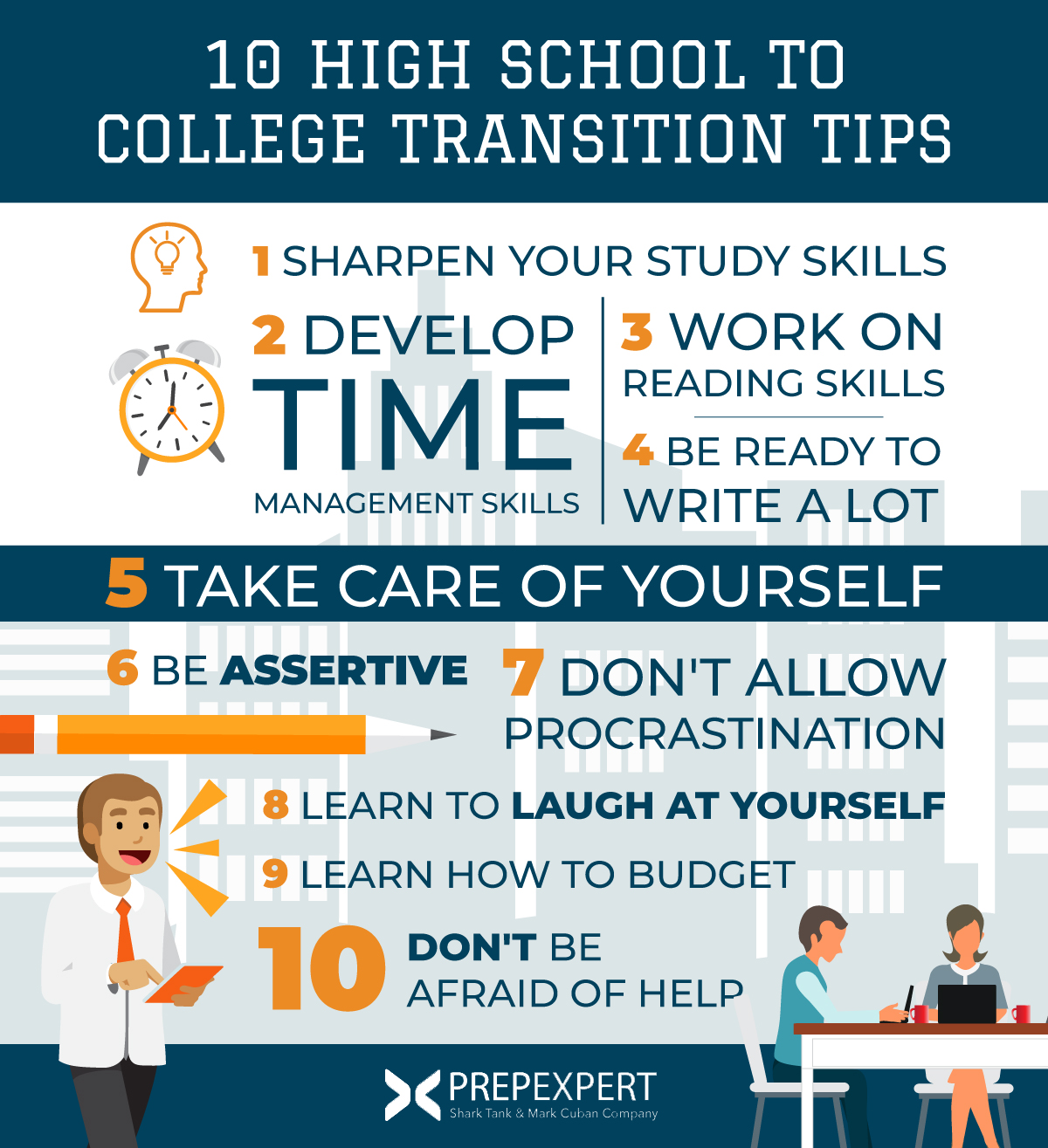
Sharpen Your Study Skills
In college, you’re going to study a lot.
Get your toolbox ready for it in high school. When making the transition to college, do the following consistently: Take Good Notes, Review Lecture Materials and Readings, Attend Class Consistently, Don’t Skip Assignments. Sound simple? It probably does but many freshmen let those things slide when getting used to campus. When they do, grades quickly fall.
[leadmagnet_five]

Develop Time Management Skills
In college, no one is forcing you to attend class.
The responsibility to do well is all on you. Making sure to attend classes on time, do your work, and show up for exams is critical. College professors are not required to make you attend. That’s why it’s important to lay out your class schedule, assignments, tests, and other responsibilities and create a workable schedule.
You won’t be able to cram for tests the night before like in high school. Plan for spending at least 2-3 hours of study time for each hour of regular class. Remember that tests in college cover much more ground; to do well on them, you need to put in the time to know everything thoroughly.

Work On Reading Skills
College reading assignments are often dense; you need to know how to extract information from them.
If you come across new or difficult words, have a dictionary on hand for quick reference. Learn how to break down an author’s argument and how it’s presented. Understand the context information is presented in, especially if asked questions where you need to access information from surrounding paragraphs for help. Build up your vocabulary and grammar rules inventory.

Be Ready To Write A Lot
Essays and papers will be your life in college; get ready for them in high school.
Work on how to organize an argument from top to bottom. You should be able to develop a thesis and support it with evidence. If you are to present an argument over multiple pages, then it’s imperative to have its structure thought out and supported. Otherwise, your professor will see you grasping at thoughts while trying to fill up space. Your goal should be logically developing an idea with ample evidence, without being too stiff to read.

Take Care Of Yourself
Develop healthy eating and rest habits.
College is the time to explore and express yourself in a new environment. Partying and long hours often result. However, if you choose to ignore sleep, diet, and exercise, your academic performance will undoubtedly drop. Stress also builds up too from poor self-care married with a full class load.
Do the best you can to establish a workout routine you enjoy, even if it’s something as simple as walking. Next, couple that activity with a simple, consistent diet you can maintain. Your body and mind will thank you in the long run.

Be Assertive
If you’re an overly shy person, you’ll need to work on developing assertiveness with others.
Almost all college freshmen live with roommates. Living with strangers requires frequent negotiation about space and social boundaries. You will need to establish what you are comfortable with tolerating from this new person. If you have specific rules that you live by, then let that person know. However, if there are moments of tension that arise, use the word “I” instead of “you” because it addresses your concerns without sounding hostile.

Don’t Allow Procrastination
College course work is overwhelming at times. Don’t let putting it off become the habit.
Remember that you are in college to learn and grow. Putting off the hard work that comes along only wastes your time and guarantees bad grades. Instead, look at the many large projects you’ll tackle and break them down into manageable tasks.
It’s easier to write a semester-ending term paper when you’ve spent the previous weeks working on notes and an outline. Preparation guarantees result in college; hoping to do well alone guarantees failure. Plus, completing those manageable tasks will help build your confidence over time.

Learn To Laugh At Yourself
School is stressful, but don’t let stress overwhelm who you are.
Learn to take a moment or two every day and laugh. It can be about something that you saw that day or about the absurdity you’ll face from professors and classmates. The point is to accept that you don’t need to feel bothered by your quirks or insecurities.
You’re in an environment with people working hard to better themselves; that fact alone means that none of them are perfect. You don’t have to force yourself to be perfect either. A good laugh will help remind you.
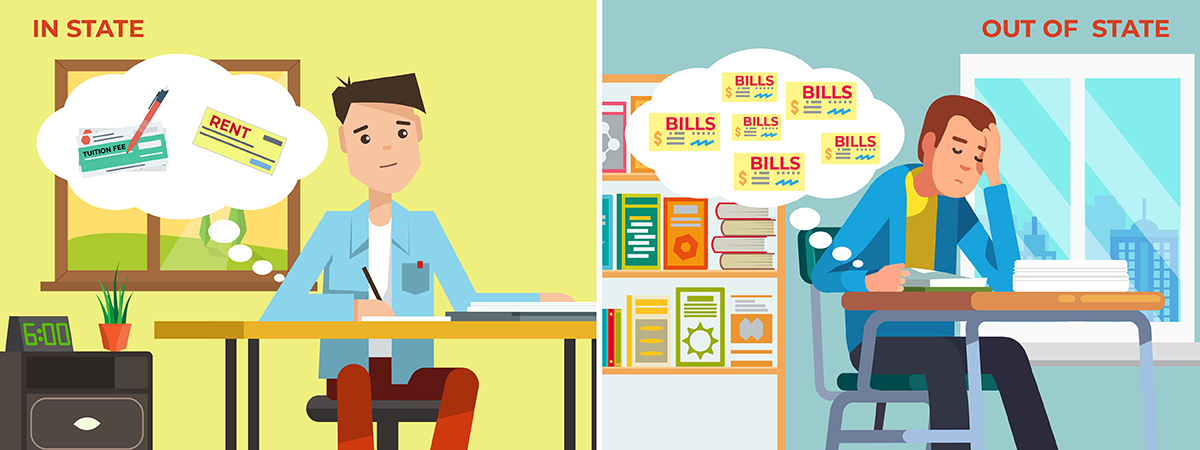
Learn How To Budget
More than likely, you will live on your own and need to manage a budget.
College is the first time many high school students actively manage their personal finances. It is a whole new world; you have to determine what you need, how much those things cost, and what you have left over. Figure out where your income is coming from too.
[leadmagnet_two]
Will you be working? Taking out loans? Getting money from family? Sitting down to figure out expenses on a weekly, monthly, and semester basis is important. The earlier you can learn how to effectively budget for yourself, the less stress you’ll feel.

Don’t Be Afraid Of Help
Adjusting to a new environment is a struggle for many people.
It’s especially difficult for students who choose to do it all by themselves. Whether it’s out of fear or pride, many freshmen carry unrealistic burdens on themselves mentally and emotionally. Don’t fall into that trap. Instead, check on campus for student resources designed to help.
Most schools have student services catering to academic tutoring, mental health, personal counseling, etc. that are there to help. If you want to get more out of your campus experience, many clubs and organizations exist to accept you. The point is that you’re not alone in college unless you choose to be. Enjoy the social experience you’ll receive there.

How Prep Expert Can Help
Besides providing standardized test prep, we also offer comprehensive admissions consulting services.
We know that getting a great SAT or ACT score is a huge part of the battle, but it’s not the final victory blow. You also need to work on your application essay, itemize and prioritize your extracurriculars, work on your interview skills, etc. We can also provide further help on making that transition your freshman year, besides the tips offered here.
Thankfully, our Admissions Director is available to help both students and parents ace the process. For more information, take a moment to check out our Admissions Consulting page for services and updates.
For more test strategy, college admissions, and scholarship application tips sign up for our FREE class happening right now!
Related Articles

Navigating the College Admissions Process: A Comprehensive Guide for Parents
Mar 5, 2024

Colleges With No Application Fee in 2024 – A Full List
Jan 30, 2024

The Best College Essay Topics
Jan 23, 2024
Recent Posts
So you think you can cheat on the digital sat, can you take the sat at any age, how hard is the act, a comprehensive digital sat prep guide, top 10 secrets to raise your child's score.
Join Prep Expert Founder and Perfect SAT Scorer Shaan Patel for this exclusive event!
$200 OFF COUPON CODE
Subscribe to our emails and get $200 OFF any Prep Expert Online Course.
Enter the coupon code SHARKTANK200 to save $200 OFF any Prep Expert Online Course!
By providing your email address, you agree to our Privacy Policy and Terms & Conditions
No thanks, I’d prefer to pay full price.
The Taconic Counseling Group
Michael A. Westerman, Ph.D.

Children and adolescents are faced with developmental tasks at many points as they grow up, but there are a few stages in life when young people meet multiple challenges all at once. The transition from high school to college is one of those critical developmental periods (see Larose et al., 2005). It is an exciting time that typically leads to considerable gains in maturity, but it is also a time during which many adolescents experience difficulties. This transition is an important event for families as well, because the family unit must navigate significant changes in relationships between family members. Again, although most families manage the transition well, it is quite common that they experience difficulties along the way.
The list of challenges young people encounter as they make the transition from high school to college is quite long. For high school students in their senior years and also for many in the second half of their junior years, there are the tasks of making decisions about which colleges to apply to and then applying to those schools. These tasks can be daunting because a number of big personal challenges are bundled up in them -- most importantly, struggling with questions about interests and goals in a way that far outstrips any previous challenges along those lines. The adolescent encounters the question "Who am I?" in many different forms, from "What academic areas do I care most about?" to "What kind of social environment is the best match for me?" Another set of challenges bundled into choosing a college concerns the adolescent's changing relationships with his or her family. All sorts of feelings come into play for young people and their families around the question of whether to live at home while attending college or to go away to school (and, if so, how far away?). Typically, choosing a college also poses difficult questions about finances for adolescents and their families, including what parents can and cannot provide and what financial responsibilities the student will have to assume.
The list of challenges for students in their freshman year in college is remarkably long (see Clark, 2005). To name just a few, in their first year at college students must negotiate: a new level and kinds of academic demands (e.g., large lecture classes in huge auditoriums, large-scale projects rather than daily assignments), becoming familiar with new surroundings and with people of varied backgrounds and beliefs, selecting and managing new extracurricular activities, developing new friendships, and managing one's time. New college students must negotiate all of these challenges while they are coming to terms with moving away from former friends, high school boyfriends or girlfriends, and, especially, their families.
From a psychological standpoint, in order to successfully negotiate the transition from high school to college, a young person must make strides in forming his or her unique identity and become more independent, which includes separating emotionally, whether or not geographically, from his or parents. These psychological hurtles are especially demanding because, as Larose et al. (2005) pointed out, young people don't have the luxury of working on them while everything else (academic demands, social situation, and so forth) remains the same. Rather, they have to form their identities and become more independent precisely by dealing with a whole new set of concrete issues.
Difficulties
Given all of this, it is not surprising that studies have shown that there is a decline in social and emotional adjustment during this period (Larose et al., 2005). Young people going through this transition experience problems and so do their families. For example, some of the adolescents I've worked with have responded to the challenges they encountered by falling back on poor coping skills, with some adolescents explaining their own difficulties by pointing to what other people (parents, professors, roommates) were doing wrong. Others withdrew from the challenges and temporarily gave up as they struggled with a sense of inadequacy and profound self-doubt.
Given how stressful the transition can be, it makes sense that research (Larose et al. 2005; McDonough, 2004) has found that adolescents do better throughout this transitional period when they receive encouragement and support from their families and feel securely attached to their parents (by all means, adolescents can feel securely attached to their parents as they separate from them). Nevertheless, the stress of this period also leads to family problems. For example, sometimes when an adolescent acts out (repeatedly getting home well after curfew, neglecting coursework, doing poorly in school) during this period of life, rebelling in the name of greater independence, he or she may really be struggling with anxiety about becoming more independent. The adolescent may be misbehaving in order to pull for greater parental involvement. In such a situation, the problem may reflect a struggle for the parents as well. They may be finding it hard to adjust to separating from their son or daughter and act in ways that work against the achievement of greater healthy independence without being aware that their actions are having this effect.
What Young People and their Parents Can Do
It can help a good deal for adolescents and their parents to keep in mind that this is a transition period. Difficulties encountered during this time probably reflect the strains of coming to terms with developmental changes rather than being indications that something is "wrong" with a young person and his or her family.
For example, writing that personal essay for a college application is a truly difficult task. Adolescents often struggle with themselves and with their parents about getting it done, and it is easy to think that if the young person had it all together, then completing the essay would be a relatively simple exercise. But that is a mistake. College admission officers do not think that applicants -- even very strong applicants -- walk around with a fully formed picture of what they want to get out of college, what they think is important about their lives, and where they are headed. Instead, the task of putting that essay together is a genuinely creative one. The process of writing it provides an opportunity to move one step forward in coming to grips with those large questions. Keeping this process view in mind won't make the essay easy to complete, but it can make writing it a positive, self-affirming experience rather than a frustrating one that brings with it feelings of inadequacy.
How Psychologists Can Help
Psychologists often can help a great deal when young people and their families encounter difficulties navigating the high school to college transition. A psychologist can evaluate whether the adolescent is attempting to cope in a counterproductive manner and whether family dynamics are part of the problem. Then, he or she can offer recommendations about whether individual therapy for the adolescent and/or family work are likely to help resolve problems. Psychologists also can help identify whether the high school or college has useful resources to turn to, such as learning centers or sessions at the school's counseling center for groups of students facing similar challenges. Psychologists familiar with this period of life also can help young people and their families make difficult decisions, such as whether it would be best for a particular student to go away to college or stay at home, or whether a particular college student would benefit from taking a leave of absence for a semester or year. Although the problems that come up are often quite upsetting and sometimes quite serious, it is usually possible to make "mid-course corrections" that result in successfully navigating the transition so that the young person can move forward with his or her education and personal development overall. In such cases, the transition, while difficult, ends up being a period during which a great deal of growth occurs.
Clark, M. R. (2005). Negotiating the freshman year: Challenges and strategies among first-year
college students. Journal of College Student Development, 46, 296-316.
Larose, S., Bernier, A., & Tarabulsy, G. M. (2005). Attachment state of mind, learning
dispositions, and academic performance during the college transition. Developmental
Psychology, 41 , 281-289.
McDonough, P. M. (2004). The school-to-college transition: Challenges and prospects.
Washington , DC : American Council on Education.
More From Forbes
4 college admissions trends shaping top schools’ decisions in 2024.
- Share to Facebook
- Share to Twitter
- Share to Linkedin
Locust Walk with students in fall, University of Pennsylvania, University City area, Philadelphia, ... [+] PA, USA
Ivy Day 2024, the day when top schools' admissions decisions are released, is a pivotal moment to explore the evolving landscape of college admissions and anticipate future directions. This year’s transformations are reshaping college application strategies in profound ways. Let's dive into the latest developments.
Return To Standardized Testing
The return to SAT and ACT requirements by institutions such as Dartmouth, Brown and MIT is a sign that many highly selective institutions may go back to requiring standardized tests. In a slight modification to the testing requirement, Yale’s test-flexible policy allows students to submit Advanced Placement and International Baccalaureate scores in lieu of the standard SAT or ACT. This shift may be in response to a decline in college readiness benchmarks ; for instance, ACT exam scores are at their lowest in 30 years, even as GPAs in core subjects rise. This gap highlights a discrepancy between students' perceived readiness and their actual preparedness.
Although I foresee more colleges reinstating standardized testing requirements, I also expect the continuation of test-optional and test-blind policies. These policies serve not only to broaden application pools from underrepresented and disadvantaged groups but also as a strategy for financially challenged institutions to attract more applicants.
In other testing news, the College Board launched the first digital SAT earlier this month , introducing a significant shift from its traditional format. This new version is adaptive and adjusts the difficulty level of questions based on the student's responses, a departure from the fixed difficulty level of previous exams. Notably, students report that the math section was more challenging than anticipated, diverging from their experiences with practice exams. Unlike the SAT, which has transitioned to a fully digital format, the ACT continues to offer both digital and traditional paper-and-pencil options.
It's advisable for students to undertake diagnostic practice exams for both the SAT and ACT to ascertain which exam aligns better with their abilities. Should the practice scores be comparable, I recommend leaning toward the ACT. This preference stems from its stability in format over the years and the choice it offers between digital and paper-based exams.
Best High-Yield Savings Accounts Of 2024
Best 5% interest savings accounts of 2024.
Given the evolving landscape of testing policies, including recent SAT modifications, students should embrace a two-pronged approach: rigorously prepare for standardized tests while remaining flexible to the possibility of not submitting scores where test-optional policies prevail.
Rethink The Importance Of The College Essay
Duke University has made significant changes to its admissions process by no longer assigning numerical ratings to applicants' standardized test scores and essays . This adjustment took effect in the current application cycle. Previously, Duke assigned values from one to five for essays and test scores, contributing to a holistic score on a 30-point scale. Now, the point system is applied only to curriculum strength, academics, recommendations, and extracurricular activities.
The move to eliminate numerical scores for essays arises from concerns about the rise in AI-generated submissions and the possibility of essays being ghostwritten. Christoph Guttentag, the dean of undergraduate admissions, noted that although essays play a pivotal role in comprehending an applicant's profile, their reliability as indicators of a student’s actual writing skills has diminished.
This adjustment is not a response to the Supreme Court's ruling against considering race in admissions decisions. Nonetheless, essays have frequently been a focal point in discussions about fostering diversity through admissions. It is expected that other institutions may similarly de-emphasize essays, thereby elevating the significance of academic transcripts, the depth of extracurricular activities, and the relevance and demand for the selected major .
Apply Early
The number of early applications (a combination of early decision and early action) has jumped by 1 million, a 60% increase, over the last five years according to Common Application data in a New York Magazine report . In contrast, applications filed during the regular decision period increased by 26% over the same timeframe. This suggests a growing trend among high school seniors to leverage early application options as part of their strategy for college admissions, reflecting the competitive nature of securing admission to top institutions.
Navigate The FAFSA Challenges
The recent overhaul of the Free Application for Federal Student Aid has led to significant delays, affecting students who rely on financial aid to make college decisions. This FAFSA situation has left many students in limbo, uncertain about their financial aid packages and, consequently, their college choices. Some colleges and universities are extending decision deadlines to accommodate the delays, but the fear remains that this could deter a significant number of students from matriculating.
Alongside the FAFSA, it is imperative for families to engage early with platforms such as the College Board’s CSS Profile. They can help unlock a broad spectrum of financial support options, from federal aid to merit-based scholarships offered by institutions. For example, utilizing tools like the Federal Student Aid Estimator and individual college’s net price calculators can provide early insights into eligibility for federal financial assistance, guiding strategic financial planning for college.
Master Your College Admissions Strategy
As the 2024 college admissions landscape poses its share of complexities, students and families are encouraged to embrace a multifaceted approach tailored to the evolving standards of higher education. From adapting to the reemergence of standardized testing requirements at esteemed institutions like Dartmouth, Brown, and MIT, to addressing the challenges posed by the digitalization of the SAT and the nuanced evaluation of college essays at Duke, it's clear that flexibility and strategic planning are paramount. Furthermore, the rise in early application submissions highlights the importance of proactivity and informed decision-making in securing a favorable college admission outcome. By fostering a thorough understanding of these trends and deploying an informed application strategy, students can enhance their prospects of achieving their academic and career aspirations in this dynamic admissions environment.

- Editorial Standards
- Reprints & Permissions

Should college essays touch on race? Some feel the affirmative action ruling leaves them no choice
C HICAGO (AP) — When she started writing her college essay, Hillary Amofa told the story she thought admissions offices wanted to hear. About being the daughter of immigrants from Ghana and growing up in a small apartment in Chicago. About hardship and struggle.
Then she deleted it all.
“I would just find myself kind of trauma-dumping,” said the 18-year-old senior at Lincoln Park High School in Chicago. “And I’m just like, this doesn’t really say anything about me as a person.”
When the Supreme Court ended affirmative action in higher education, it left the college essay as one of few places where race can play a role in admissions decisions. For many students of color, instantly more was riding on the already high-stakes writing assignment. Some say they felt pressure to exploit their hardships as they competed for a spot on campus.
Amofa was just starting to think about her essay when the court issued its decision, and it left her with a wave of questions. Could she still write about her race? Could she be penalized for it? She wanted to tell colleges about her heritage but she didn’t want to be defined by it.
In English class, Amofa and her classmates read sample essays that all seemed to focus on some trauma or hardship. It left her with the impression she had to write about her life's hardest moments to show how far she'd come. But she and some of her classmates wondered if their lives had been hard enough to catch the attention of admissions offices.
“For a lot of students, there’s a feeling of, like, having to go through something so horrible to feel worthy of going to school, which is kind of sad,” said Amofa, the daughter of a hospital technician and an Uber driver.
This year’s senior class is the first in decades to navigate college admissions without affirmative action . The Supreme Court upheld the practice in decisions going back to the 1970s, but this court’s conservative supermajority found it is unconstitutional for colleges to give students extra weight because of their race alone.
Still, the decision left room for race to play an indirect role: Chief Justice John Roberts wrote universities can still consider how an applicant’s life was shaped by their race, “so long as that discussion is concretely tied to a quality of character or unique ability.”
“A benefit to a student who overcame racial discrimination, for example, must be tied to that student’s courage and determination,” he wrote.
Scores of colleges responded with new essay prompts asking about students’ backgrounds. Brown University asked applicants how “an aspect of your growing up has inspired or challenged you.” Rice University asked students how their perspectives were shaped by their “background, experiences, upbringing, and/or racial identity.”
When Darrian Merritt started writing his essay, he knew the stakes were higher than ever because of the court’s decision. His first instinct was to write about events that led to him going to live with his grandmother as a child.
Those were painful memories, but he thought they might play well at schools like Yale, Stanford and Vanderbilt.
“I feel like the admissions committee might expect a sob story or a tragic story,” said Merritt, a senior in Cleveland. “And if you don’t provide that, then maybe they’re not going to feel like you went through enough to deserve having a spot at the university. I wrestled with that a lot.”
He wrote drafts focusing on his childhood, but it never amounted to more than a collection of memories. Eventually he abandoned the idea and aimed for an essay that would stand out for its positivity.
Merritt wrote about a summer camp where he started to feel more comfortable in his own skin. He described embracing his personality and defying his tendency to please others. The essay had humor — it centered on a water gun fight where he had victory in sight but, in a comedic twist, slipped and fell. But the essay also reflects on his feelings of not being “Black enough” and getting made fun of for listening to “white people music."
“I was like, ‘OK, I’m going to write this for me, and we’re just going to see how it goes,’” he said. “It just felt real, and it felt like an honest story.”
The essay describes a breakthrough as he learned "to take ownership of myself and my future by sharing my true personality with the people I encounter. ... I realized that the first chapter of my own story had just been written.”
Like many students, Max Decker of Portland, Oregon, had drafted a college essay on one topic, only to change direction after the Supreme Court ruling in June.
Decker initially wrote about his love for video games. In a childhood surrounded by constant change, navigating his parents’ divorce, the games he took from place to place on his Nintendo DS were a source of comfort.
But the essay he submitted to colleges focused on the community he found through Word is Bond, a leadership group for young Black men in Portland.
As the only biracial, Jewish kid with divorced parents in a predominantly white, Christian community, Decker wrote he constantly felt like the odd one out. On a trip with Word is Bond to Capitol Hill, he and friends who looked just like him shook hands with lawmakers. The experience, he wrote, changed how he saw himself.
“It’s because I’m different that I provide something precious to the world, not the other way around,” he wrote.
As a first-generation college student, Decker thought about the subtle ways his peers seemed to know more about navigating the admissions process . They made sure to get into advanced classes at the start of high school, and they knew how to secure glowing letters of recommendation.
If writing about race would give him a slight edge and show admissions officers a fuller picture of his achievements, he wanted to take that small advantage.
His first memory about race, Decker said, was when he went to get a haircut in elementary school and the barber made rude comments about his curly hair. Until recently, the insecurity that moment created led him to keep his hair buzzed short.
Through Word is Bond, Decker said he found a space to explore his identity as a Black man. It was one of the first times he was surrounded by Black peers and saw Black role models. It filled him with a sense of pride in his identity. No more buzzcut.
The pressure to write about race involved a tradeoff with other important things in his life, Decker said. That included his passion for journalism, like the piece he wrote on efforts to revive a once-thriving Black neighborhood in Portland. In the end, he squeezed in 100 characters about his journalism under the application’s activities section.
“My final essay, it felt true to myself. But the difference between that and my other essay was the fact that it wasn’t the truth that I necessarily wanted to share,” said Decker, whose top college choice is Tulane, in New Orleans, because of the region’s diversity. “It felt like I just had to limit the truth I was sharing to what I feel like the world is expecting of me.”
Before the Supreme Court ruling, it seemed a given to Imani Laird that colleges would consider the ways that race had touched her life. But now, she felt like she had to spell it out.
As she started her essay, she reflected on how she had faced bias or felt overlooked as a Black student in predominantly white spaces.
There was the year in math class when the teacher kept calling her by the name of another Black student. There were the comments that she’d have an easier time getting into college because she was Black .
“I didn’t have it easier because of my race,” said Laird, a senior at Newton South High School in the Boston suburbs who was accepted at Wellesley and Howard University, and is waiting to hear from several Ivy League colleges. “I had stuff I had to overcome.”
In her final essays, she wrote about her grandfather, who served in the military but was denied access to GI Bill benefits because of his race.
She described how discrimination fueled her ambition to excel and pursue a career in public policy.
“So, I never settled for mediocrity,” she wrote. “Regardless of the subject, my goal in class was not just to participate but to excel. Beyond academics, I wanted to excel while remembering what started this motivation in the first place.”
Amofa used to think affirmative action was only a factor at schools like Harvard and Yale. After the court's ruling, she was surprised to find that race was taken into account even at some public universities she was applying to.
Now, without affirmative action, she wondered if mostly white schools will become even whiter.
It's been on her mind as she chooses between Indiana University and the University of Dayton, both of which have relatively few Black students. When she was one of the only Black students in her grade school, she could fall back on her family and Ghanaian friends at church. At college, she worries about loneliness.
“That’s what I’m nervous about,” she said. “Going and just feeling so isolated, even though I’m constantly around people.”
The first drafts of her essay focused on growing up in a low-income family, sharing a bedroom with her brother and grandmother. But it didn’t tell colleges about who she is now, she said.
Her final essay tells how she came to embrace her natural hair . She wrote about going to a mostly white grade school where classmates made jokes about her afro. When her grandmother sent her back with braids or cornrows, they made fun of those too.
Over time, she ignored their insults and found beauty in the styles worn by women in her life. She now runs a business doing braids and other hairstyles in her neighborhood.
“I stopped seeing myself through the lens of the European traditional beauty standards and started seeing myself through the lens that I created,” Amofa wrote.
“Criticism will persist, but it loses its power when you know there’s a crown on your head!"
Ma reported from Portland, Oregon.
The Associated Press’ education coverage receives financial support from multiple private foundations. AP is solely responsible for all content. Find AP’s standards for working with philanthropies, a list of supporters and funded coverage areas at AP.org .

The 7 Best Medical Schools in Chicago – 2024
March 29, 2024

Chicago, often dubbed “the Windy City,” is renowned for its iconic skyline, deep-dish pizza, and esteemed medical institutions. Among the plethora of Chicago medical schools, these institutions hold a rich history of medical education and research, drawing aspiring physicians from across the globe. In this comprehensive guide, we’ll explore the med schools in Chicago, delving into their locations, acceptance rates, academic criteria, and unique offerings.
Please note that these schools are ordered by acceptance rate, from lowest to highest. The number is not indicative of one school being “better” than another. All schools on this list are fantastic world-class medical schools from which you can launch a successful medical career.
You may also wish to explore these related blogs:
- Best Medical Schools in California
- Average MCAT Scores at Top Med Schools
- Best Medical Schools in Canada
1) Loyola University Chicago Stritch School of Medicine
- Location: Maywood
- Acceptance Rate: 1.31%
- Average GPA: 3.6
- Average MCAT: 510
- Degrees Offered: MD, MD/Ph.D., MD/MPH, MD/MS, MD/MA, MD/MBA
With a class size of 170 students, Loyola University Chicago Stritch School of Medicine is guided by Jesuit values, prioritizing holistic care and addressing health disparities. Central to the curriculum are the Patient-Centered Medicine (PCM) courses, where faculty provide guidance on navigating challenging medical scenarios such as death, end-of-life care, and physician burnout. Students can participate in one of three honors programs—Global Health, Bioethics, or Research—earning distinctions at graduation. Finally, the school provides unique elective programming and extracurricular experiences, including courses like the Ignatian Service Immersion global health experience and language programs such as Medical Spanish and Medical Polish.
2) The University of Chicago Pritzker School of Medicine
- Location: Hyde Park, Chicago
- Acceptance Rate: 1.37%
- Average GPA: 3.87
- Average MCAT: 519
Located within the University of Chicago campus, the Pritzker School of Medicine offers an intimate learning environment with a small class size of 90 students per cohort. Situated on the South Side of Chicago, students enjoy a college-town atmosphere while accessing diverse communities through six student-run free clinics. Being one of the few medical schools integrated into its university campus, students benefit from interdisciplinary collaboration opportunities across various fields. With 35% of each class from underrepresented backgrounds, the school prioritizes diversity and inclusion, fostering culturally competent physicians ready to address global healthcare needs.
Chicago Med Schools (Continued)
3) northwestern university feinberg school of medicine.
- Location: Streeterville, Chicago
- Acceptance Rate: 1.85%
- Average GPA: 3.92
- Average MCAT: 520
Northwestern’s Feinberg School of Medicine , with a class size of 150 students, stands as a premier institution renowned for its research excellence and commitment to global health initiatives. With an impressive 68% of graduates matching at top-25 residency programs in 2024 and half of students engaging in global health experiences, Feinberg ensures its graduates are well-prepared for success in the field. Additionally, students embark on a four-year Area of Scholarly Concentration project, conducting longitudinal research projects under esteemed faculty mentorship. The Feinberg School of Medicine not only emphasizes academic rigor and research but also places a high value on student wellness, equipping students with skills for resilience, balance, and career satisfaction.
4) Chicago Medical School at Rosalind Franklin University of Medicine & Science
- Location: North Chicago
- Acceptance Rate: 2.02%
- Average GPA: 3.66
- Average MCAT: 512
- Degrees Offered: MD, MD with Distinction in Research, MD/Ph.D.
At the Chicago Medical School (CMS) at Rosalind Franklin University, located in Chicago, students experience diverse clinical rotations at outpatient clinics and urban medical centers. CMS emphasizes patient-centered care, teaching students that patients are central to the care model and essential members of the healthcare team. Students learn the importance of positive patient interactions and clear communication, honing their skills in simulation labs with supportive faculty. Early exposure to patients in various clinical settings, including inner-city hospitals serving the underserved and the Federal Health Care Center for military personnel, provides valuable hands-on experience. Despite its large class size of 200, CMS remains committed to excellence in medical education and community engagement.
Best Medical Schools in Chicago (Continued)
5) rush university medical college.
- Location: Near West Side, Chicago
- Acceptance Rate: 5.8%
- Average GPA: 3.62
- Average MCAT: 509
- Degrees Offered: MD
Rush Medical College features a more intimate class size, typically around 130 students. Within this close-knit community, students have the exceptional opportunity to participate in EXPLORE Rush during their preclinical years, refining vital clinical skills under the guidance of faculty mentors. Moreover, Rush offers two distinctive four-year longitudinal programs in family medicine and health equity and social justice. As students progress, clinical rotations offer a diverse learning experience, spanning Rush University Medical Center and John H. Stroger, Jr. Hospital of Cook County. Additionally, Rush Medical College fosters engagement through the Rush Community Service Initiatives Programs, encouraging students to actively contribute to patient outreach and education initiatives within the West Chicago community.
6) University of Illinois College of Medicine
- Acceptance Rate: 7.8%
- Average GPA: 3.78
- Average MCAT: 514
- Degrees Offered: MD, MD/Ph.D., MD/MPH, MD/MS, MD/MBA
The U niversity of Illinois College of Medicine stands as the largest public medical school nationwide, spanning three campuses in Chicago, Peoria, and Rockford. Across all campuses, the curriculum, values, and clinical experiences remain consistent. Notably, the Chicago campus plays a pivotal role in serving a diverse and underserved patient population within the University Medical District, including the University of Illinois Hospital and affiliated clinics throughout the city. Additionally, the college offers optional Scholarly Concentration Programs, providing specialized medical training pathways over four years in fields such as innovation medicine, urban medicine, and global medicine.
7) Chicago College of Osteopathic Medicine of Midwestern University
- Location: Downers Grove
- Acceptance Rate: 2.7%
- Average GPA: 3.7
- Degrees Offered: DO
Chicago College of Osteopathic Medicine (CCOM) is a leading private osteopathic medical school just west of Chicago. Midwestern University, CCOM’s home, holds significant influence in osteopathic medicine. In fact, its graduates represent nearly 13% of practicing osteopathic physicians and surgeons nationwide. The curriculum emphasizes discipline-based learning and fosters patient-centered care. Students can gain clinical experience through various on-campus clinics, including dental, family practice, speech and language, and optometry clinics at the Midwestern University Multi-Specialty Clinic.
What Makes Chicago Medical Schools Different?
Opting for a medical school in Chicago offers a plethora of distinct advantages tailored to aspiring physicians. Firstly, Chicago’s status as a renowned healthcare hub ensures unparalleled clinical exposure. With access to prestigious institutions like the University of Chicago Medical Center and Northwestern Memorial Hospital, students engage in diverse clinical rotations spanning various medical specialties. Moreover, Chicago’s diverse patient population, reflective of the city’s multicultural fabric, enriches students’ experiences, fostering cultural competency and empathy.
Furthermore, Chicago’s dynamic urban landscape offers a rich tapestry of cultural experiences and extracurricular opportunities. The city boasts world-class research institutions and medical facilities, including the Rehabilitation Institute of Chicago and the Shirley Ryan AbilityLab, providing students with access to cutting-edge medical advancements and hands-on research experiences. Whether participating in groundbreaking studies or collaborating with experts in their field, students benefit from a stimulating intellectual atmosphere that drives innovation and academic excellence.
What Do You Need to Get into Chicago Medical Schools?
To gain admission to Chicago medical schools, aspiring students typically need to meet rigorous academic and extracurricular criteria. Firstly, a strong academic background is essential, with most institutions requiring a bachelor’s degree from an accredited university or college, preferably with a focus on pre-medical coursework. Competitive GPA and MCAT scores are crucial, often serving as primary indicators of academic aptitude.
Additionally, candidates are expected to demonstrate a genuine passion for medicine through relevant extracurricular activities, such as clinical volunteering, research experience, and leadership roles in healthcare-related organizations. Strong letters of recommendation from professors, physicians, or mentors who can attest to the candidate’s character and suitability for medical school are also typically required. Moreover, successful applicants often showcase well-rounded personal attributes in their medical school personal statement. These qualities include resilience, empathy, and a commitment to serving diverse communities, aligning with the values of med schools in Chicago.
For high school students contemplating a future in medicine, there are several advantageous pathways to consider. Exploring accelerated BS/MD programs , which offer a streamlined route to medical school, can provide invaluable opportunities for those committed to pursuing a medical career from an early stage. What’s more, investigating renowned feeder institutions and top pre-med schools can offer a strong foundation in the sciences and prepare students for the rigors of medical school admission. Early assurance medical programs provide a pathway for exceptional undergraduates to secure a spot in medical school before completing their bachelor’s degree, easing the transition into medical education.
Choosing a Chicago Med School
Ultimately, selecting the right medical school involves a comprehensive assessment of one’s goals, values, and aspirations. Ensuring alignment with these factors guarantees a rewarding and fulfilling journey toward a career in medicine, particularly within the dynamic and vibrant city of Chicago, where numerous opportunities for growth and advancement abound.
- Medical School Admissions

Emily Schmidt
Emily is currently a professional writer in the healthcare industry. As a former journalist, her work focused on climate change, health disparities, and education. She holds two bachelor's degrees in English and Spanish from Stanford University, and a master's in journalism from Arizona State University. Her first published novel debuted in 2020, and she hopes to finish her second novel by the end of this year.
- 2-Year Colleges
- Application Strategies
- Big Picture
- Career & Personality Assessment
- College Essay
- College Search/Knowledge
- College Success
- Costs & Financial Aid
- Dental School Admissions
- Extracurricular Activities
- Graduate School Admissions
- High School Success
- High Schools
- Law School Admissions
- Navigating the Admissions Process
- Online Learning
- Private High School Spotlight
- Summer Program Spotlight
- Summer Programs
- Test Prep Provider Spotlight

“Innovative and invaluable…use this book as your college lifeline.”
— Lynn O'Shaughnessy
Nationally Recognized College Expert
College Planning in Your Inbox
Join our information-packed monthly newsletter.
Sign Up Now
Is your child struggling to master the potty? These 5 takeaways from our panel can help
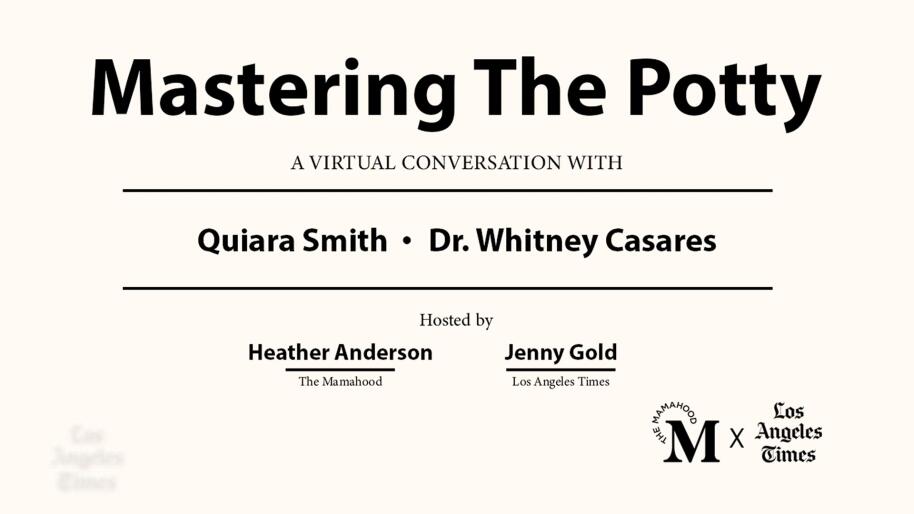
- Show more sharing options
- Copy Link URL Copied!
Potty training isn’t easy and it can vary a lot from child to child. The L.A. Times spoke with experts about how parents can best navigate this chapter, how they can prepare their child for a new level of independence and how they can tell that it’s actually time to start.
Here are five takeaways from a discussion among Jenny Gold, L.A. Times early childhood reporter; Heather Anderson, administrator of the Mamahood Facebook group; Whitney Casares, Modern Mommy Doc founder and pediatrician; and Quiara Smith, CEO of Aloha Integrative Therapy and occupational therapist. They spoke to the Mamahood Facebook group.

Are you a SoCal mom?
The L.A. Times early childhood team wants to connect with you! Find us in the Mamahood’s mom group on Facebook. Share your perspective and ask us questions.
Let your child’s development dictate when you begin to potty train.
Children will generally be ready to potty train between 2 and 3 years old, but there are also individual developmental factors that come into play. You should make sure your child is able to physically sit on the toilet, has the desire to go to the bathroom and can communicate with you that they need to go, Casares said.
A child needs to understand what it feels like when their bladder is full, Smith added. They need to be able to link that feeling to control over the necessary muscles, which is dependent on their development.
It’s important to choose potty-training methods that suit your child’s needs. Casares recommends starting with the three-day method , which recommends parents commit to leaving their child naked from the waist down for three days, while having them drink lots of liquids and encouraging them to use the bathroom every 15 minutes. It’s meant to teach kids to grow more in tune with their body’s cues. From there, adapt to your child’s needs as you see fit, she said.
Choose a time to potty train when you can be present with your child and can observe whether they are resisting your chosen method, so that you can adapt, Casares said. You might find success by introducing a rewards chart, for example.
You’ll want to demonstrate flexibility, patience and understanding.
You can encourage your child to learn even when they aren’t quite ready to start
You can help grow interest in potty training concepts early on through play, books and songs. Some kids might show curiosity before they’re ready to start. It’s OK to indulge them and bring out a kid’s potty, Casares said, but don’t start the training until they have the skills to do it.
Help them learn about their bodies in a playful manner. Draw pictures of the body with them. Explain what it is and why it’s happening. It’s important to remember your child is absorbing all the information and looking for you to guide them, she added.
Establish a fiber-rich diet early on so that your child can develop bowel regularity. Feed them leafy greens and as well as fruits and vegetables. And make sure they’re staying hydrated as well so that the fiber can take effect. It’ll help them avoid problems with pooping and constipation when they start potty training.
Find ways to make public bathrooms more comfortable both at school and beyond.
Public bathrooms can be intimidating. Loud noises, bright lights and funny smells can make your child nervous, especially if they deal with sensory processing issues. With the expansion of California’s transitional kindergarten , kids are starting school younger and without the same bathroom support they may have had at a preschool.
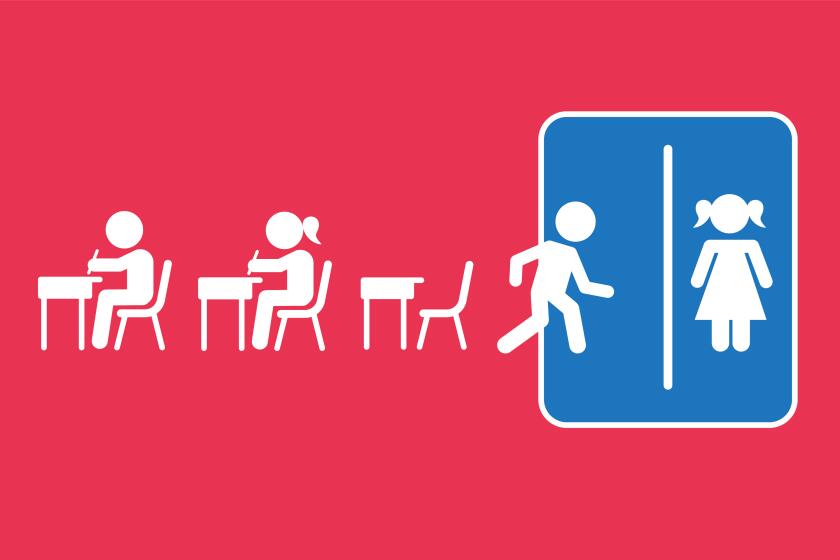
Potty training, ‘accidents,’ wiping issues complicate 4-year-olds’ start at public schools
California’s 4-year-olds are entering transitional kindergarten. But many young learners aren’t fully potty-trained, an issue public schools are grappling with.
Aug. 7, 2023
Smith recommended creating a sensory bag for your child that can include items like sunglasses if your child is sensitive to the bathroom’s bright lights, noise-canceling headphones if they’re scared of the flush and smelly hand sanitizer that they can spray to mask the bathroom smell. If your child is scared of automatic flushing, you can also cover the automatic flush sensors with a sticky note so as to not catch them by surprise, Smith said.
If your child deals with anxiety or sensory issues, Casares recommends teaching your child to make a “nest” out of toilet paper to cover the toilet seat. As they transition to using a bathroom outside of their home, it might bring your child comfort to have a similar surface to sit on no matter where they go.
If your child needs assistance going to the bathroom at school, parents can request accommodations through a 504 Plan, which dictates how a school can support a student with disabilities in the classroom. The plan can provide extra time in the bathroom or allow for an aide to assist with wiping or in modifying lighting and sounds in the bathroom.
Help your child understand concepts involved with going to the bathroom
Teach them to wipe surfaces around the house to get them to understand that the point of wiping is to clean. They can wipe a counter or a window, for example. Then transition to on-body wiping. You can put soap on their arm in the bath and have them wipe it off, Smith suggested. Once they start wiping themselves, help them learn the movement by wiping with your hand over theirs using either a wet wipe or toilet paper.
These practices will help them develop the fine motor control they need to do it on their own, Smith said. Though the task might seem small, don’t forget that it takes lots of coordination, range of motion, strength and balance to perform.
Being away from a familiar space like home might also add a bit of anxiety, so it’s important to give your child the practice and resources they need to succeed under the pressure.

Help children learn to use the bathroom on their own with these expert resources
Public schools want children to be fully potty-trained when they enter transitional kindergarten. Use these resources to help them develop their independence.
Potty training can take time. Assess what’s working and what isn’t.
Don’t sweat it if your child has mastered some aspects of potty training but is struggling with others. Some days might feel less productive, and that’s normal.
If your child is scared to potty train, talk to them about why. Validate their feelings and let their answers help you problem-solve. Have them drink more water or eat more vegetables and create a more calming environment.
Understand what factors might be affecting their progress. If your child is successfully peeing in the potty, but is struggling to poop, lots of times it’s because they’ve been dealing with constipation since infancy, Smith said. They might not trust the sensation and withhold it, in turn causing more constipation. It’s often a trauma imprint, she explained.
If you’re worried that your child is still wetting the bed at night, know that it’s normal for many kids who are simply not developmentally ready to prevent accidents at night. It’s OK to still rely on pull-ups if you need to. Some kids may wet the bed until they reach puberty, Casares said.
This article is part of The Times’ early childhood education initiative, focusing on the learning and development of California children from birth to age 5. For more information about the initiative and its philanthropic funders, go to latimes.com/earlyed .
More to Read

Kate Middleton is helping her kids through cancer diagnosis. How to talk to your children
March 23, 2024

Why youth sports drive parents crazy and 10 more lessons from a mom who’s been through it
Jan. 30, 2024

Feeling drained? Here’s how to rediscover your childlike wonder
Jan. 18, 2024
Start your day right
Sign up for Essential California for news, features and recommendations from the L.A. Times and beyond in your inbox six days a week.
You may occasionally receive promotional content from the Los Angeles Times.

Kate Sequeira is the audience engagement editor for the Los Angeles Times early childhood education initiative. She worked previously as a production specialist for The Times’ Reading by 9 literacy program.
More From the Los Angeles Times

Former official pleads guilty to embezzling nearly $16 million from O.C. school district
March 29, 2024

World & Nation
Should college essays touch on race? Some say affirmative action ruling leaves them no choice
March 27, 2024

New Occidental College president bullish on liberal arts, champion of equity and inclusion
March 26, 2024
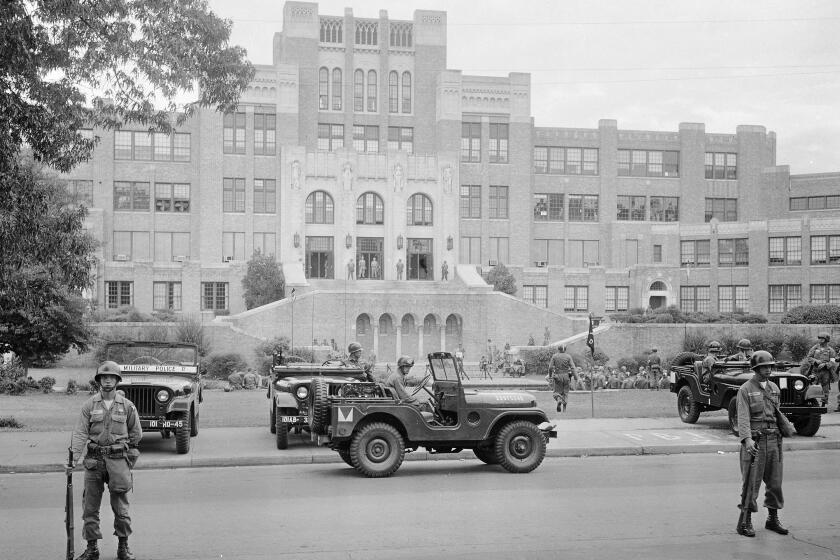
High school teacher and students sue over Arkansas’ ban on critical race theory

IMAGES
COMMENTS
The composition scholars Nancy Sommers and Laura Saltz describe the transition from high school to college writing as a "paradigm shift" in which students cross a "threshold" from learning and restating information toward questioning ideas and entering larger conversations (125, 139). Beyond summarizing secondary sources, students are ...
The Transition Of High School Essay. The transition from high school to college is a dynamic time in one's life that parallels the change from childhood to adulthood. Both of these changes are dramatic and, as a result, feelings are difficult to put down into words. A messy combination of emotions fills the heart, surfacing in strange ways.
The transition from high school to college is a significant milestone, marking a period of personal growth and newfound independence. This guide aims to provide a detailed overview of the key differences between high school and college life, offering insights for students and parents navigating this transformative period. ... Essays, projects ...
The transition from high school to college serves as a bridge between two distinct worlds. In high school, the structure is often more rigid, with a set schedule and close monitoring from teachers and parents. College, on the other hand, offers greater autonomy and freedom. This newfound independence can be liberating, but it can also be ...
The idea is to work at doing what we do best and what we truly want the most. That's the only way to find meaning or satisfaction in the future, through our own accomplishments. My path was a difficult one, but I am sharing it with you so you will know what you may face in the coming years. This is the story of my experience in the transition ...
Summary. The vast majority of high school students aspire to some kind of postsecondary education, yet far too many of them enter college without the basic content knowledge, skills, or habits of mind they need to succeed. Andrea Venezia and Laura Jaeger look at the state of college readiness among high school students, the effectiveness of ...
The Transition from High School to University Writing. Written by Becky Vogan and Jerry Plotnick, University College Writing Centre. Printable PDF Version. Fair-Use Policy. To meet the expectations of university writing, you will need to unlearn rules you may have learned in high school. Those rules may have helped you to plan and write your ...
Being able to take notes efficiently is the basis for academic success. Note-taking is a demanding skill. If you learn it during high school, your skill will improve your exam scores and help you to study with less effort during college. Note-taking has to be intelligent, selective, and critical. It requires practice and a lot of focus on your ...
Time Management: The most important thing to focus on in the high school to college transition is the development of time management skills. You may be taking fewer courses at once than you did in high school, but the courses are harder and don't meet every day. You'll need to keep careful track of assignment deadlines, and you'll need to be ...
Coming out of high school, you may be used to having homework assignments to help "cushion" your grades. In college, your grade is determined by how you do on a couple of exams and writing assignments. If you don't do so well on one, then you may end up with a C final grade, at best. With that said, don't expect to coast through college ...
Knowing these habits is the first step to overcoming them. The first "deadly habit" is trying to bring high school study habits to college courses. In high school many students had no problem waiting until the last minute to do work and still got good grades, but that's not as easy in college. "You probably can do high school work in ...
Breaking away from the 5-paragraph essay. We learned this format as early as elementary school and applied it throughout middle and high school. Here is the basic structure: Introduction. 1 st body paragraph: Main idea #1. 2 nd body paragraph: Main idea #2. 3 rd body paragraph: Main idea #3. Conclusion.
5.Learn to take time for yourself. A very important skill to develop is learning how to take a step back from everything and de-stress. In college, so much can be going on that sometimes you want a chance to breathe. Maybe that means not going to that basketball game or not going out on Friday night to instead stay in and watch Netflix or ...
In college, you could have as few as 30 or even 15 class sessions for one class. By just missing one class, you are missing a large amount of material. Think about your courses in monetary terms, as well. Say, for example, your tuition is $7,000 for the semester. If you have five classes, each class is worth $1,400.
Making the Transition to College. You and your fellow students were among the best high school students in the world, but making the transition from being a successful high school student to a successful college student still takes work. Here are some strategies to help you succeed at Princeton. Keep up with the material by studying every day.
College professors are not required to make you attend. That's why it's important to lay out your class schedule, assignments, tests, and other responsibilities and create a workable schedule. You won't be able to cram for tests the night before like in high school. Plan for spending at least 2-3 hours of study time for each hour of ...
5. Prioritize self-care and mental health. The high school to college transition is both a physical and emotional transition. To be your best self, it's important to make time for activities that boosts mental health. At Central Michigan University, students have access to various resources that promote self-care.
the long run, college is cheaper than free. Not going to college will cost you about half a million dollars. Mr. Autors paper arrives at that figure first by calculating the very real cost of tuition and fees. This amount is then subtracted from the lifetime gap between the earnings of college graduates and high school graduates. After
The transition from high school to college is one of those critical developmental periods (see Larose et al., 2005). It is an exciting time that typically leads to considerable gains in maturity, but it is also a time during which many adolescents experience difficulties. ... For example, writing that personal essay for a college application is ...
1. Embrace being nervous. Transitioning from high school to college can be hard. Friends that you made in high school may be going to different schools, but don't worry, that's just how life goes. You will be in a new environment, but don't fret. Step out of your comfort zone!
Personal Narrative: My Transition From High School To College. "I know applying to colleges is the last thing you want to do right now, but you might change your mind," a trusted friend told me. It was December of my senior year of high school, and college application deadlines were approaching quickly. I was recovering from a major illness ...
Students must take the initiative to develop good note-taking skills (of reading materials as well as of lectures), attend class regularly, and stay on top of assigned or recommended assignments ...
AP Lit Prose Essay Examples - The College Board's Advanced Placement Literature and Composition Course is one of the most enriching experiences that high school students can have. It exposes you to literature that most people don't encounter until college , and it helps you develop analytical and critical thinking skills that will enhance ...
Rethink The Importance Of The College Essay Duke University has made significant changes to its admissions process by no longer assigning numerical ratings to applicants' standardized test scores ...
Max Decker, a senior at Lincoln High School, sits for a portrait in the school library where he often worked on writing his college essays, in Portland, Ore., Wednesday, March 20, 2024.
Additionally, the college offers optional Scholarly Concentration Programs, providing specialized medical training pathways over four years in fields such as innovation medicine, urban medicine, and global medicine. Best Medical Schools in Chicago (Continued) 7) Chicago College of Osteopathic Medicine of Midwestern University. Location: Downers ...
A pediatrician and an occupational therapist share tips for parents tackling potty training with their kids. Here are five takeaways from their talk.